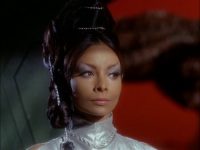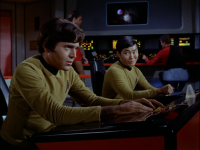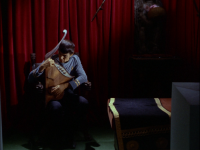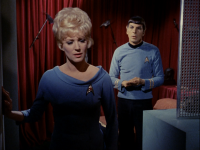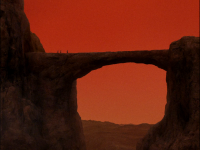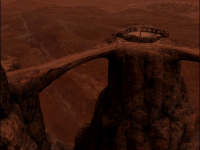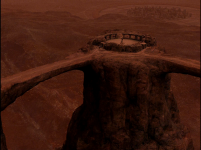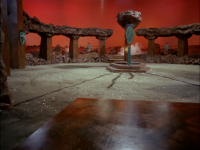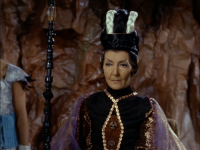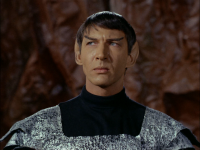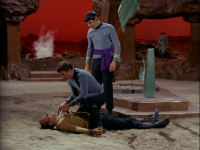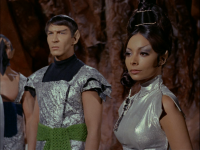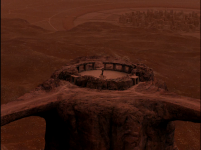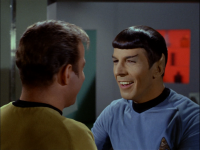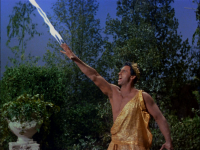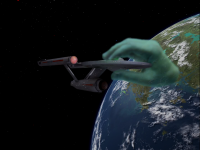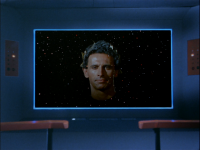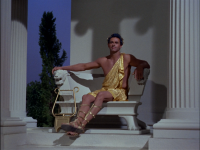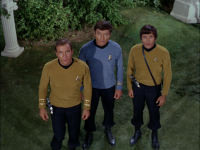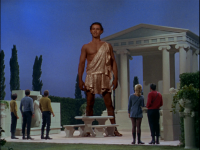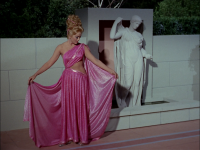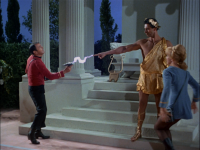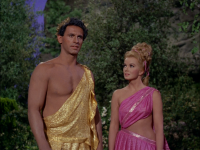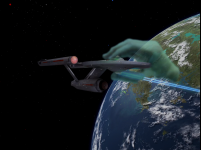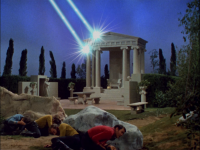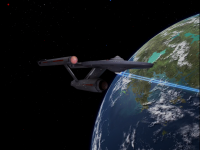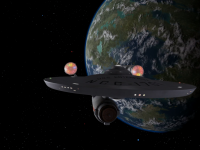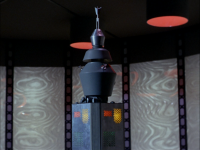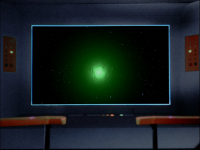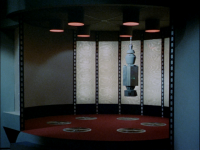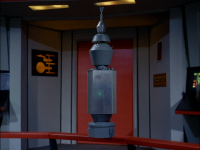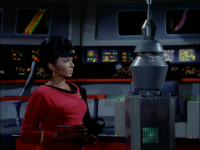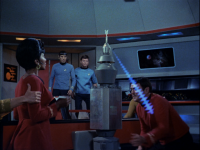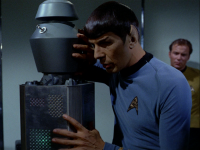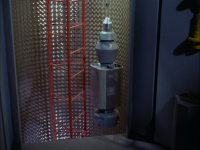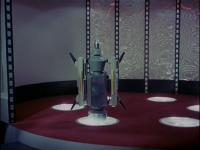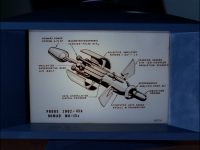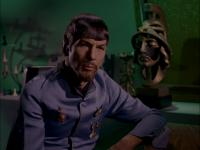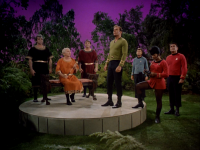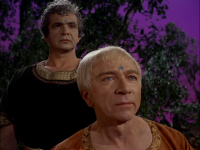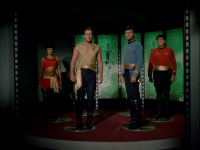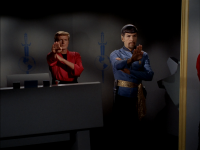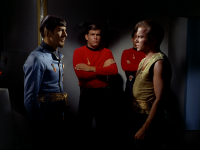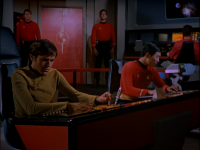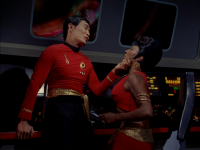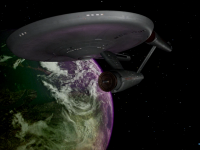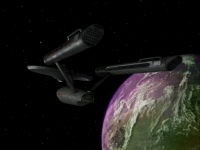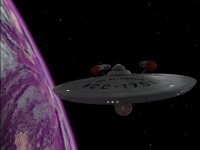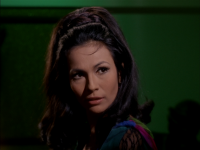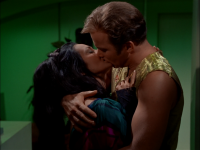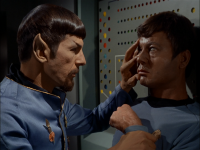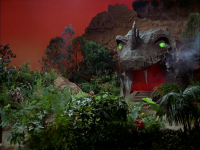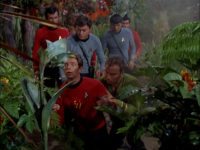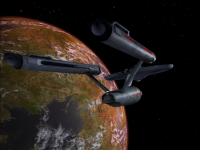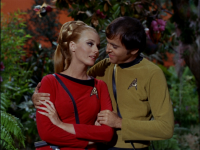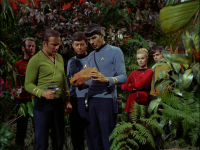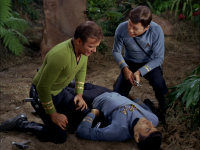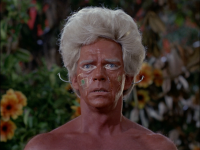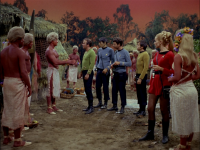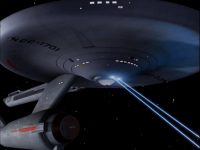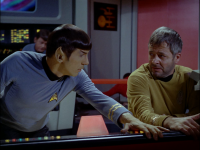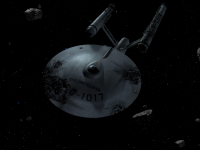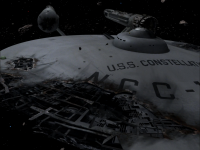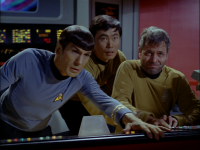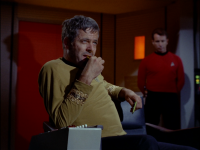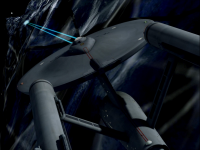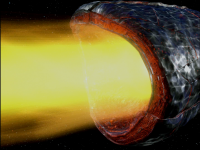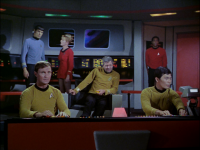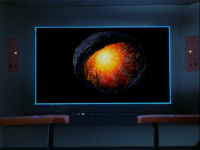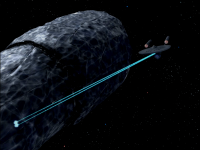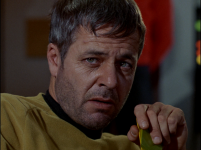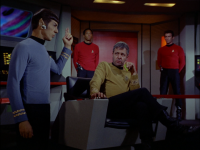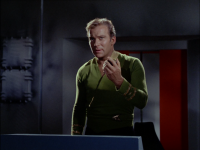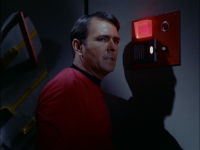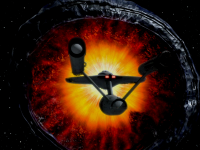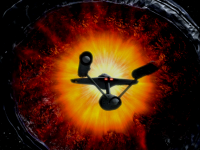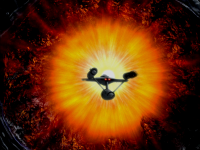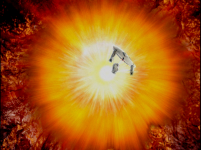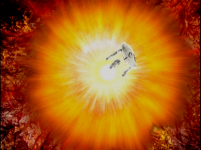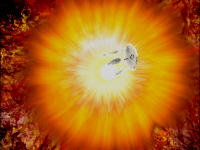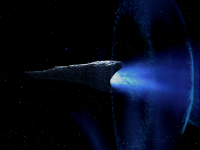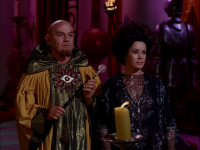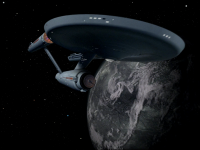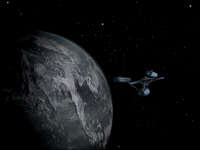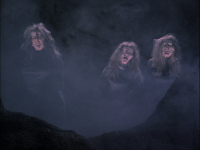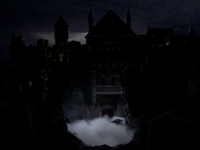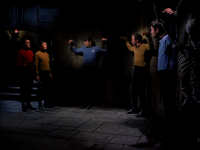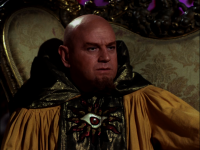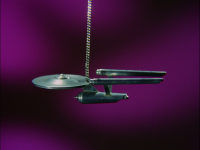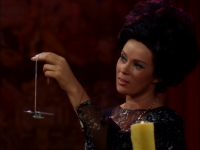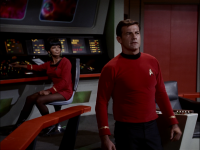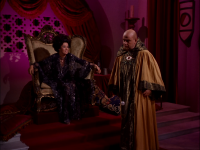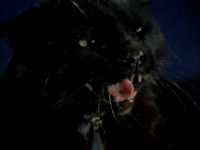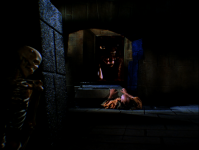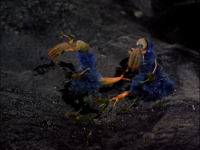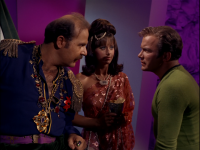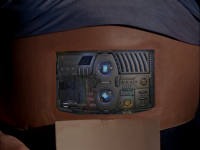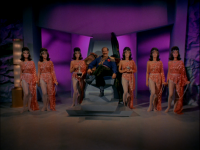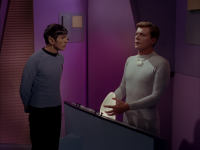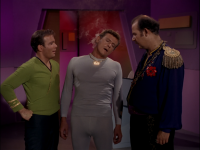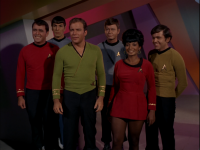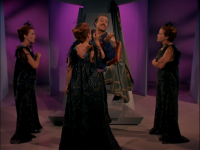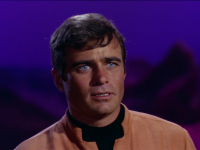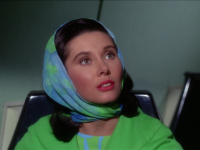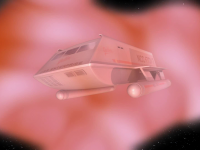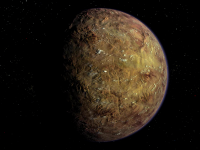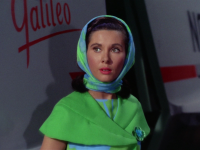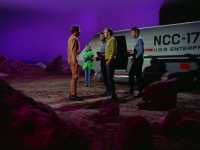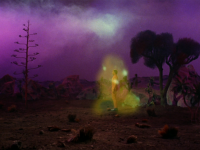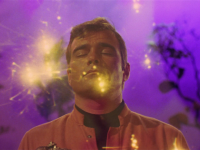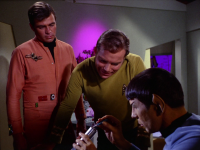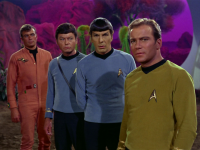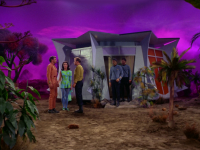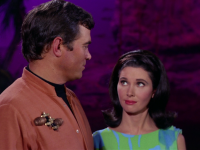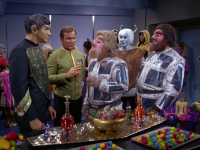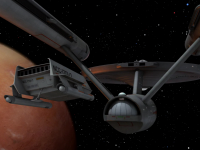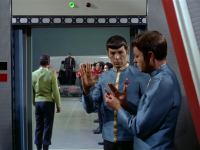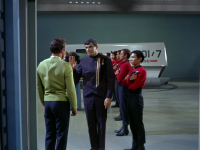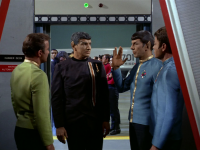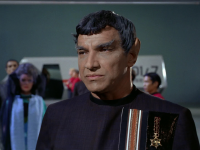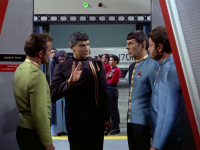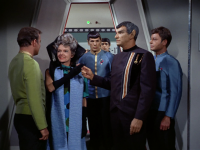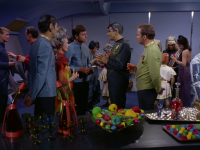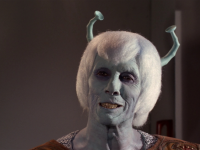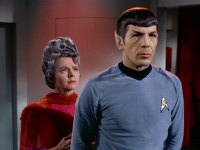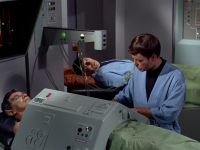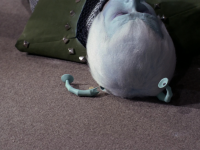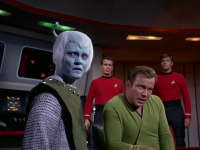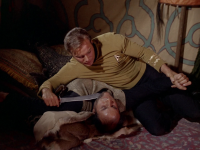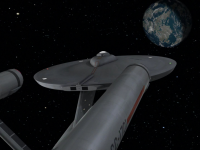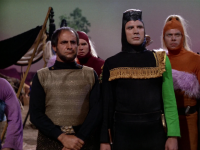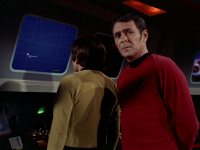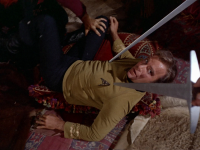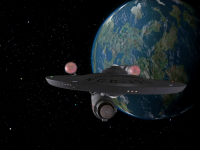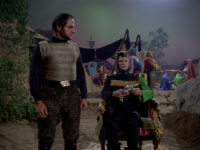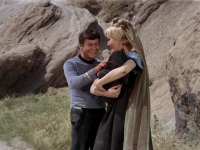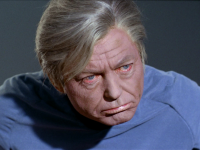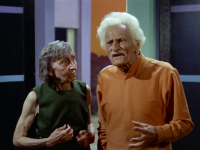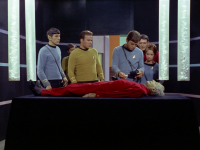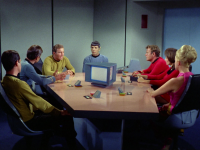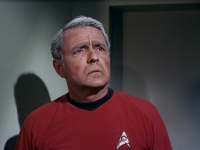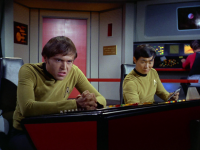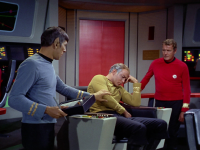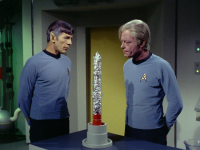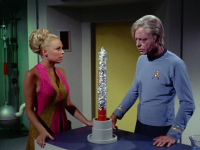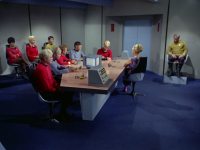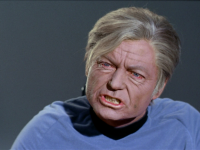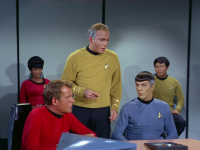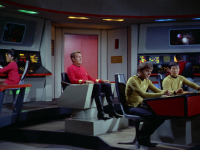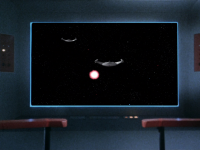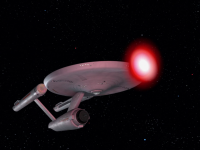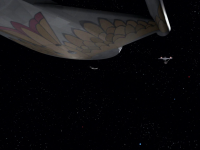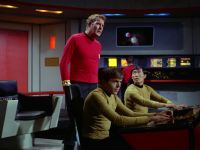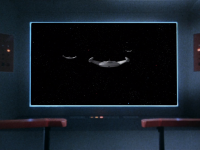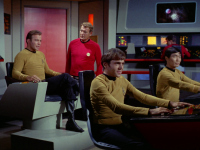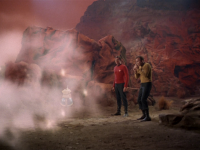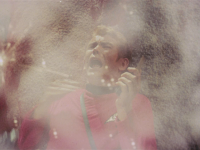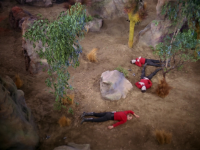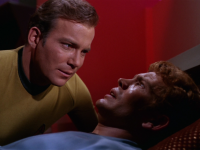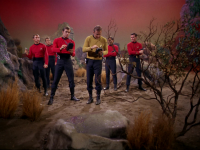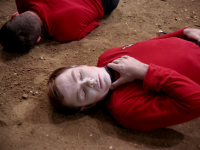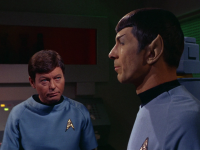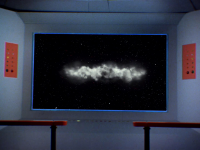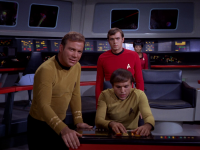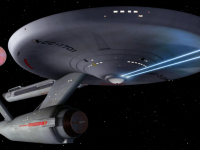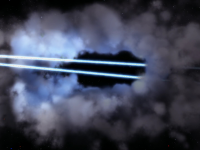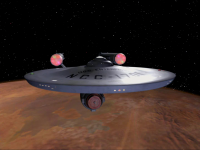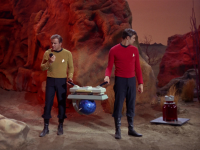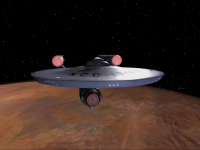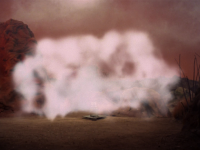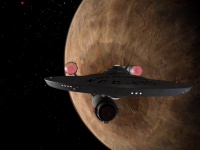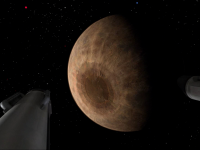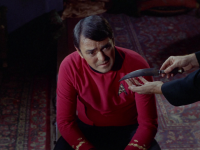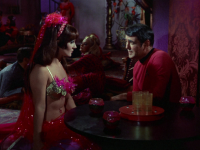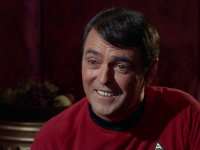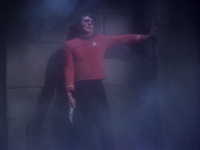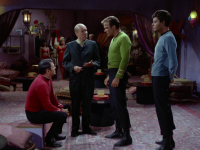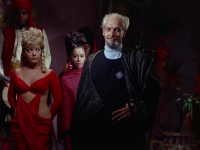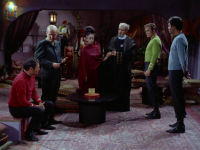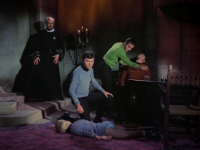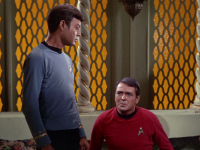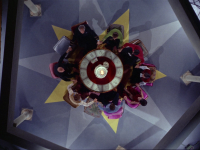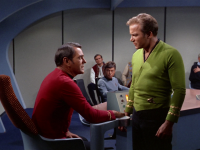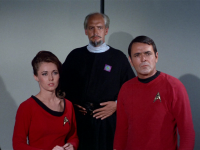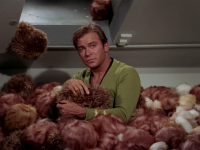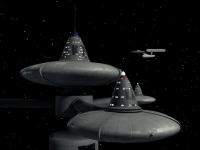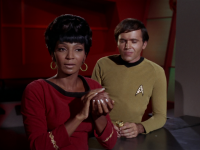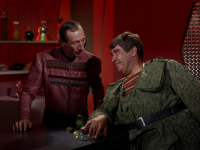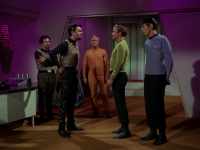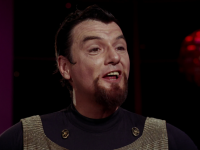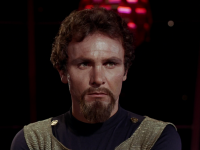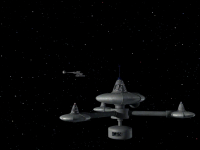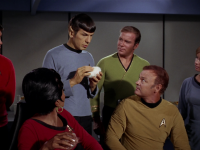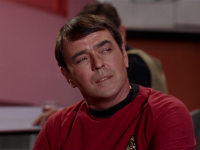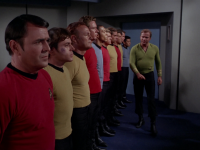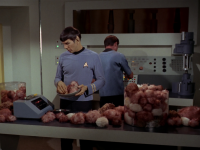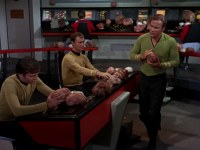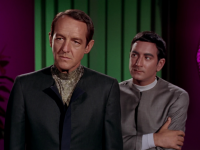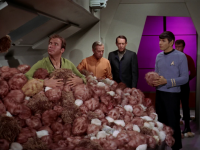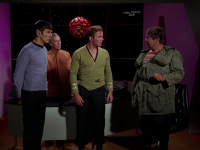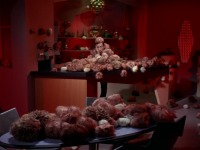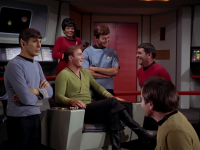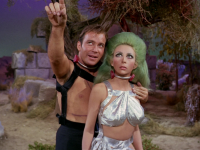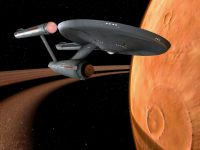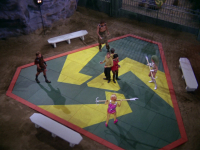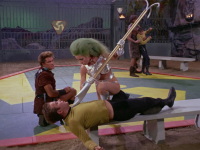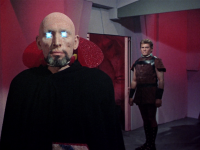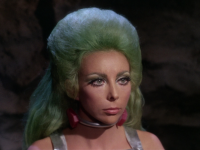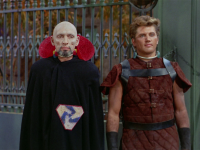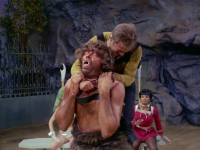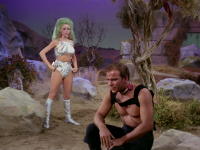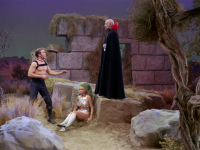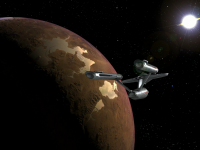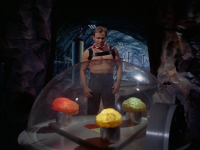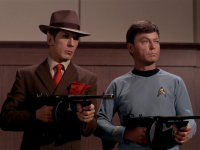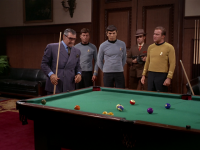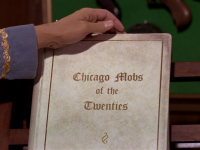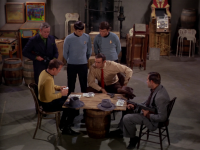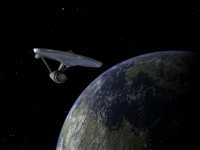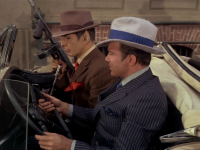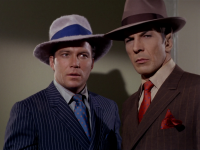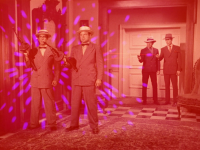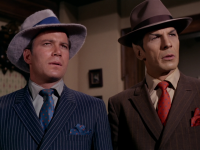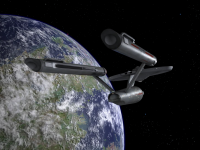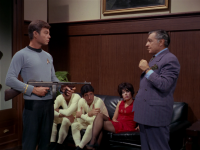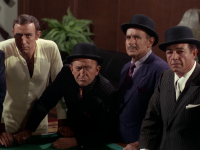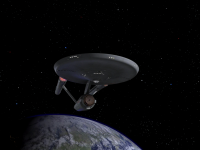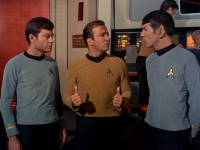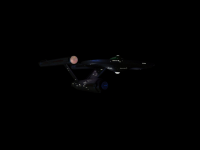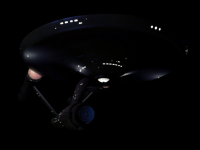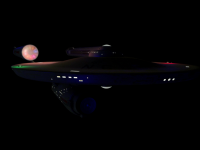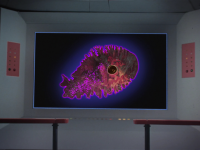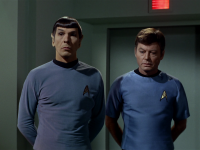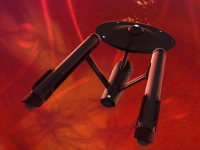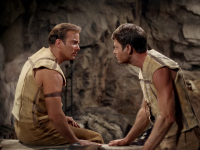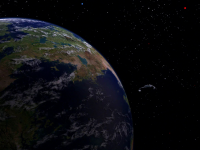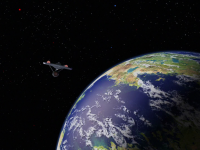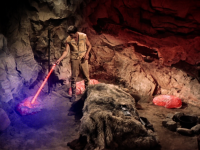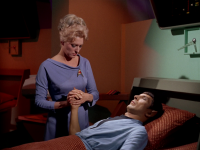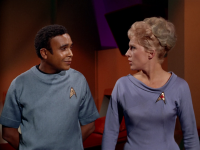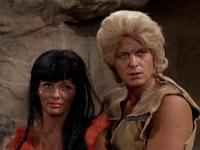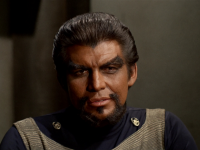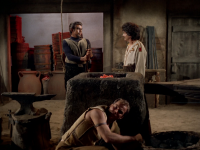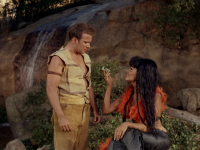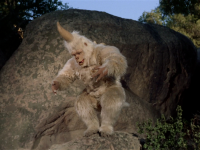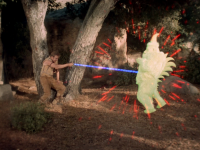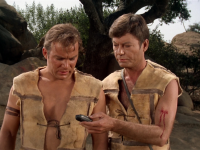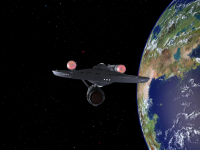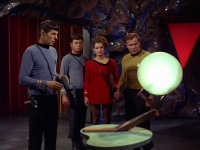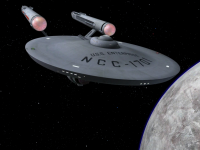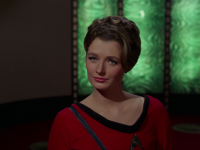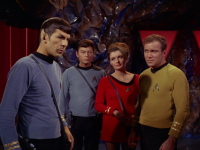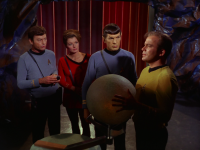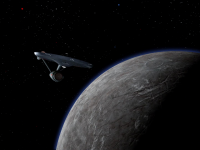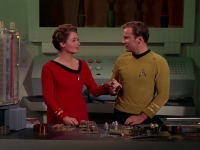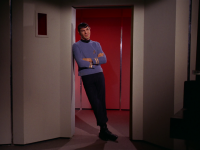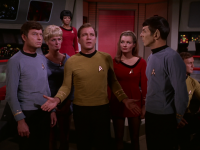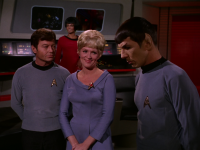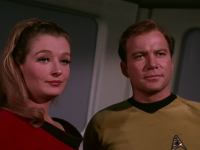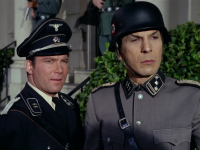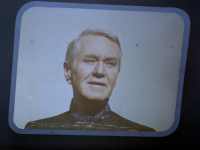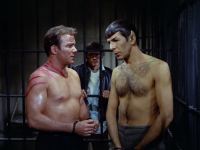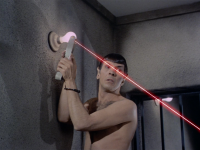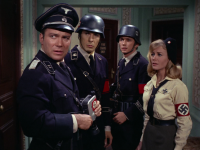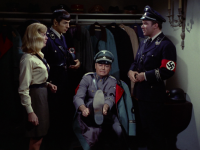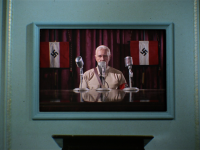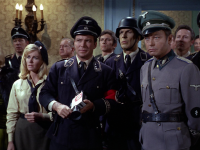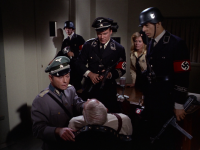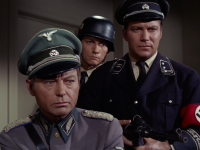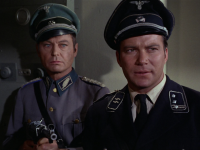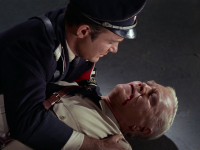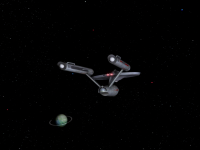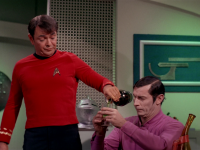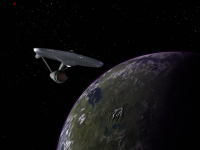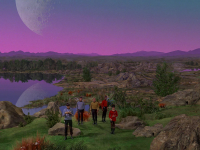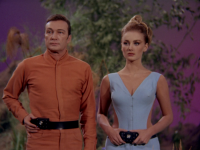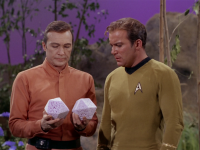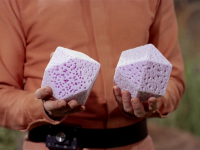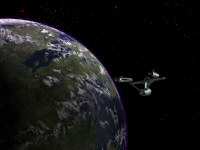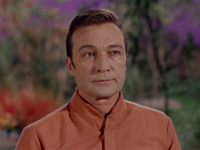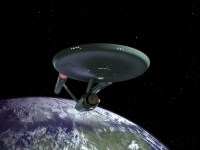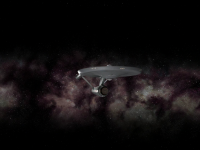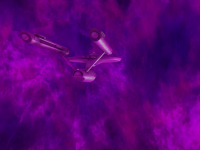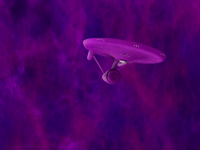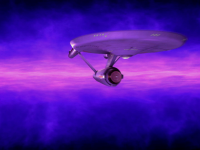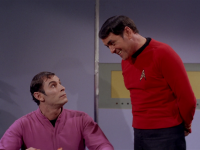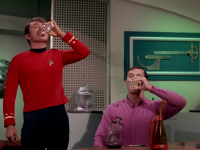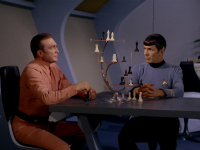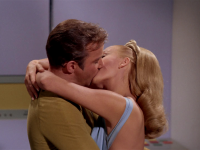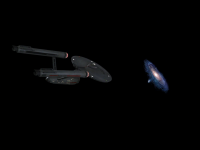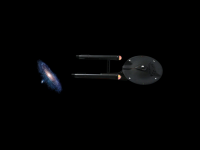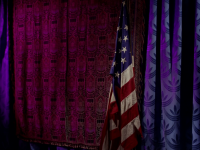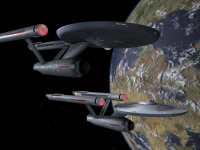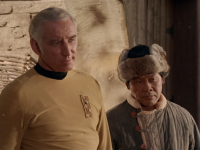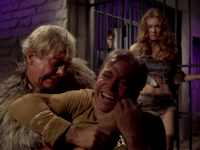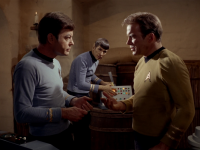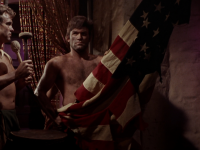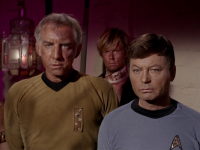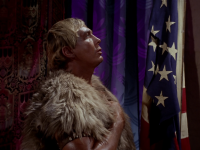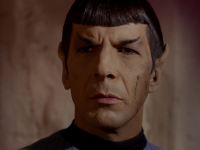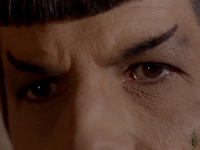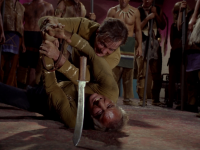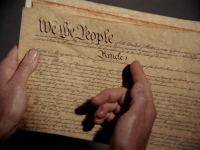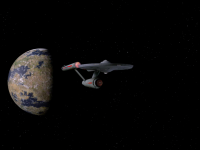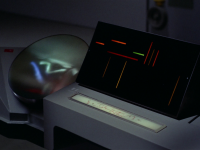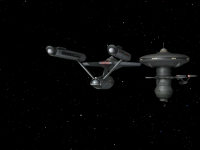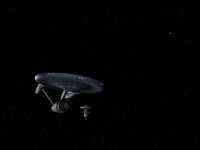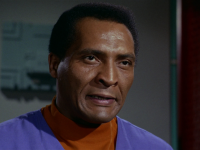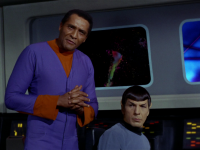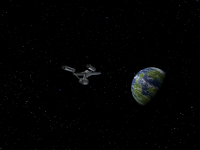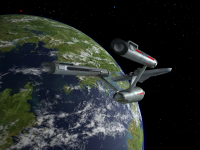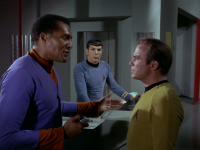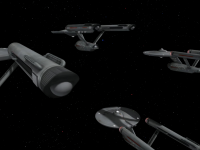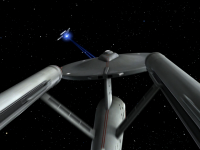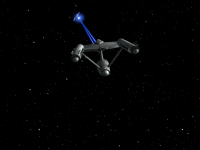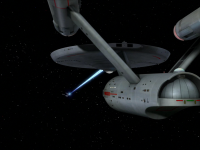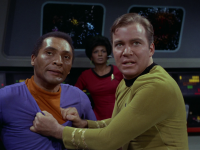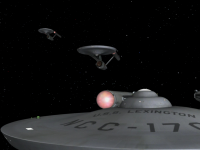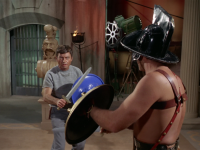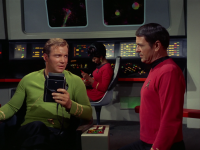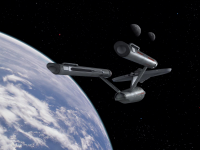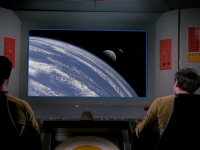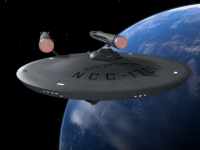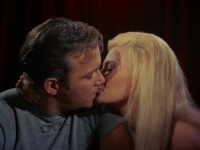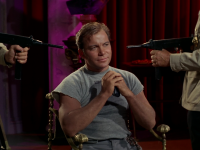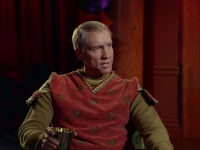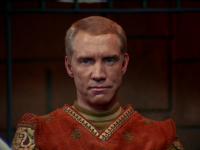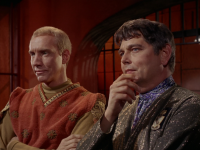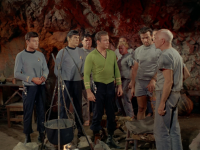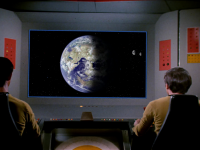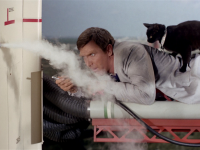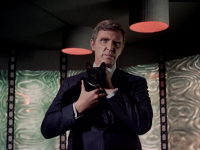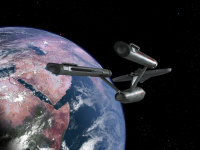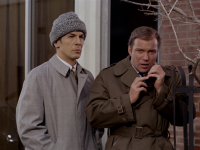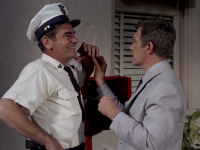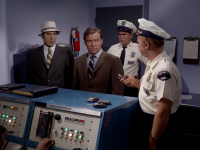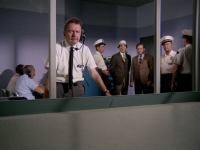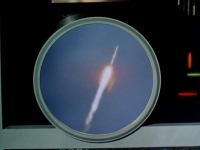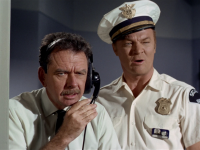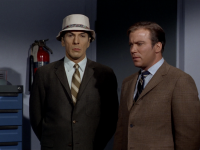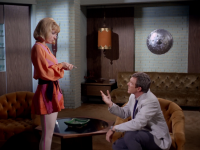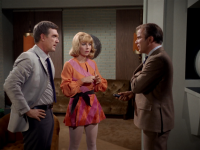Star Trek: The Original Series — 2x01 — Amok Time
Synopsis
Spock undergoes the Vulcan mating ceremony.
Filler rating: not filler
Aside from being one of Star Trek's most famous episodes, this episode also contains a great deal of crucial exposition about Vulcans and is Chekov's first episode.
Remarkable scenes
- McCoy describing Spock's behavior to Kirk.
- Spock freaking out at Nurse Chapel.
- Sulu and Chekov discussing the abrupt course changes.
- Spock: "How do Vulcans choose their mates? Have you ever wondered?" Kirk: "I guess the rest of us just assumed it was done... quite logically!"
- Spock bashing his computer monitor. The effect was cheap and cheezy, but hilarious nevertheless.
- Kirk and McCoy expressing awe over the fact that Spock knows T'Pau, a revered Vulcan celebrity.
- Kirk and Spock fighting.
- Spock "killing" Kirk.
- T'Pring explaining her motives for the death match.
- Spock to T'Pring's new husband: "She is yours. After a time you may find that having is not so pleasing a thing, after all, as wanting. It is not logical, but it is often true."
- Spock and T'Pau to each other: "Live long and prosper."
- Spock's reaction to seeing Kirk alive and well. Gotta love Spock's brief smile.
Review
This episode skillfully dramatizes the secret mating ritual of the Vulcan people. Known as the pon farr, it is a time honored tradition that the Vulcan people seem to pour their entire emotional core into; the one exception to their rigid culture of emotional purging. Since Spock is half human, his emotional control has always been somewhat weaker than the average Vulcan and Spock had hoped in vain that his unusual ancestry would spare him the full effect of the pon farr. Like clockwork, Spock's marriage to T'Pring, arranged at childhood and consummated with a mind meld, reasserted itself at a most inconvenient time, causing Spock to experience the "blood fever." It is stated in this episode that had he not returned home to participate in the ceremony with T'Pring, the emotional trauma could have actually killed him. All of that exposition and so much more coalesces into what is easily the most nuanced and interesting depiction of an alien culture on Star Trek so far. Combined with great writing, good plotting, and even an excellent score, this episode is strikingly original.
Only minor blemishes diminish the storytelling. For instance, when Kirk spoke with Starfleet Command, he failed to mention that Spock's life was in danger. Although the conversation was cut short by the terse commodore, it still seems like Kirk should have mentioned that. The next most annoying detail was the unusual speech patterns of T'Pau. All of that "if thee this" and "thyself that" was pretty awkward stuff to listen to; definitely not the best aesthetic choice. Although I will confess to greatly enjoying her line questioning Spock "art thee Vulcan or art thee human" in spite of the old timey vocabulary. The ceremony itself slowed down the pace of the plot considerably and the episode probably could have benefited from being five or ten minutes shorter in general, but overall the episode was way above average. Everything from the smart inclusion of a Nurse Chapel subplot dealing with her unrequited love for Spock to T'Pring's chillingly logical explanation of her scheming to Spock was excellent drama.
Star Trek: The Original Series — 2x02 — Who Mourns for Adonais?
Synopsis
The Enterprise is held captive by the Greek god Apollo.
Filler rating: bad filler
Pretty lame episode with no significant long term continuity.
Remarkable scenes
- Kirk and McCoy making fun of Scotty being for smitten with the historian officer.
- Scotty fighting for his girl in vain.
- Kirk making fun of Chekov's age and supposed vulnerability to young, pretty girls.
- The Enterprise phasering Apollo out of existence.
Review
While the idea that the gods of ancient civilizations were in fact advanced space aliens taking advantage of primitive humanity is an intriguing premise for a science fiction story, the way this episode tells such a story leaves much to be desired. Aside from the fact that Star Trek has already featured far too many god-like aliens, nearly every aesthetic choice made in this episode is overwrought and embarrassing to watch, especially the giant hand forcefield which fondles the Enterprise all episode. More than that we've got yet another story where the Enterprise is held hostage by the guest antagonist of the week with an irrational motive, yet another female officer who falls for the arrogant bad guy of the week, and yet another plot resolved by blowing up a concealed power source fueling a bag of magic tricks.
Then there's the logical problem about why Apollo and his comrades ever left Earth to begin with. Apollo mentions that the Greeks simply stopped worshipping him and his comrades. Okay, and how did they get away with that exactly? Kirk's crew was only narrowly able to avoid enslavement by Apollo by firing phasers at his power source. I'm not an expert on history, but I'm pretty sure the ancient Greeks didn't have phasers with which to overthrow their gods. If Apollo and his comrades wanted them to keep worshipping, they certainly could have forced the Greeks to continue doing so.
There is a powerful theme in this story though which is nicely summed up by a line from Kirk which opens with "mankind has no need for gods." This is an excellent illustration of the episode's theme, as the whole point of the story is to demonstrate how the whole concept of a god is little more than a human psychological construction to explain observations (or imaginings) which appear supernatural. Kirk even says that mankind has outgrown gods in a manner easily likened to how children outgrow their infantile toys. But Kirk undermines that entire point and in doing so the entire theme of the episode in his very next sentence by stating "we find the one quite adequate." In that single sentence, Kirk's credibility suddenly vanishes. How could mankind have outgrown gods if it still needs to believe in one? All in all, I'll sum up this episode by saying what a great idea for a story wasted on such bad storytelling.
Star Trek: The Original Series — 2x03 — The Changeling
Synopsis
The Enterprise encounters a probe named Nomad.
Filler rating: bad filler
Pretty lame episode with no significant long term continuity.
Remarkable scenes
- Nomad thinking Kirk is its creator because he's from Earth and his last name is the same as the creator's.
- Nomad killing Scotty and wiping Uhura's memory.
- McCoy: "He's dead, Jim." Count 3.
- Spock: "That 'unit' is a woman." Nomad: "A mass of conflicting impulses."
- Nomad "repairing" Scott.
- Nomad enhancing the warp engines.
- Kirk talking Nomad to death.
Review
This irritating episode is painful to watch and all too familiar. Once again Kirk talks a computer death, a feat made possible by the fact that, as I wrote in my review of Return of the Archons, "computers in the Star Trek universe have a tendency to be emotionally unstable and explode when they are sufficiently upset, contrary to how computers work in the real world." But that's not all, for there are any number of terrible aesthetic choices to pick on in this rather half-baked story. For starters, I find it hard to believe that the Enterprise could withstand even one blast, let alone four, equivalent to 90 photon torpedoes striking the ship at warp 15, or ~3375 times the speed of light. Then there's Spock's silly mind meld with Nomad. How was that supposed to even work exactly? What's next, Spock mind melding with the ship's computer to make course corrections? All of this to the backdrop of listening to Nomad irrelevantly restate its name over and over again and utter prominent examples of eloquent phrasing such as, "Non sequitur. Your facts are uncoordinated."
For a prop as awkward and unthreatening as Nomad was, it was nevertheless just filled to the brim with overwrought capabilities. In addition to the excessive weaponry, it managed to kill Scotty and then bring him back to life, fly through forcefields, vaporize a number of security personnel, and wipe Uhura's memory. The plot point about Uhura losing all of her knowledge and needing to be "reeducated" is perhaps the most annoying part of the story. In a single day she goes from an elementary school level of knowledge back to college level. For us to swallow this fact, we have to assume that Nomad didn't really wipe her memory at all. Instead, it must have caused her to experience some kind of amnesia. The knowledge must have still been there, but rendered difficult for Uhura to access. Or at least I hope this is the case because if it isn't then the whole thing becomes very difficult to explain very quickly. Not to mention the fact that the crew seems to have little regard for the possibility that Uhura may have forgotten everything about her personal life.
But poor aesthetics are nothing new on Star Trek. Perhaps the most unforgivable aspect of the story is the recklessness with which Kirk and Spock treat Nomad in the first place. At the beginning of the story, Nomad starts firing extremely powerful weapons at the ship. Kirk barely manages to convince it to stop and Nomad offers to visit the ship. From this moment forward, Nomad was vulnerable. At any moment Kirk could have used the transporter to destroy Nomad, as I'm pretty sure a device capable of dematerializing something and then rematerializing it elsewhere is capable of permanently dematerializing something and never rematerializing it. But we can rationalize that oversight quite simply by saying that Nomad's defense screens would not have permitted this, in spite of the fact that Kirk and Spock never tried. The issue of recklessness crosses into unforgivable territory shortly before the mind meld scene. Kirk explicitly convinced Nomad to lower its screens to allow Spock to mind meld with it. Why not phaser the damn thing out of existence as soon as it did so? Who cares where it came from and why it got this way? Kirk's and Spock's reckless scientific curiosity cost the lives of several crewmen and nearly the entire ship.
All things considered despite the value and originality of a story about a space probe encountering something dangerously unexpected and its mission being corrupted beyond repair, the story's promising potential is drowned out by an onslaught of bad storytelling which is becoming all too common on Star Trek by this point.
Star Trek: The Original Series — 2x04 — Mirror, Mirror
Synopsis
Kirk, Scott, McCoy and Uhura enter a parallel universe.
Filler rating: not filler
This is the first episode to feature the mirror universe. It won't be seen again until Star Trek Deep Space Nine.
Remarkable scenes
- The transition into the mirror universe.
- I love the new militant look on board the evil Enterprise.
- The ruthless Spock.
- Evil Chekov betraying the captain.
- Good McCoy: "I'm a doctor, not an engineer!" (Count #4 for "I'm a doctor, not a [blah]" style lines McCoy is famous for.)
- The computer telling good Kirk that he succeeded to command of the Enterprise through the assassination of former captain Christopher Pike.
- Evil landing party in good universe.
- Evil Spock telling good Kirk of his orders to kill him.
- Evil Spock threatening evil Sulu.
- Good Uhura seducing evil Sulu and then turning a knife on hm.
- Evil Spock taking on the entire landing party.
- Evil Spock mind melding with good McCoy.
- Good Uhura disabling evil Kirk's girlfriend.
- Spock, a man of integrity in both universes.
- Good Kirk trying to convince evil Spock to lead a revolution against the Earth Empire.
- McCoy, regarding Spock: "I think I liked him with a beard better. It gave him character."
Review
After a painfully banal opening scene featuring yet another alien race that looks exactly like humans (except for a dot on their foreheads...), the landing party beams up into pure awesomeness: the mirror universe. Then after a brief moment of stilted dialog in which Kirk jumps to conclusions way too quickly about the exact nature of their predicament, the episode soars forward on this absurd premise masterfully extracting well executed comedy and even an inkling of terrific drama from an episode that turns out to be far more entertaining than it probably should be.
The irresistible fun of this story is mentally noting all the subtle differences in this parallel universe where the Federation is instead the Earth Empire and Kirk is a conqueror instead of an explorer. The bewildered landing party does an excellent job adapting to their new roles and slowly scheming their way back to their own universe all the while taking the audience for a wild ride filled with hysterically treacherous asides. My favorite detail of this story is the extensive use of secondary characters. Uhura beats people up, Scotty sabotages things, and Sulu turns into a violent womanizing villain.
Kirk's performance is the centerpiece of the story though. I can't help but admire his obvious inability to take any of it seriously. He acts as though throughout the entire episode he's questioning whether or not it's all some kind of freaky dream. Every time he sees another twisted absurdity he just shrugs it off with bemused amusement and it is perhaps this total detachment from the reality he ever so briefly inhabits that allows him to so nonchalantly persuade evil Spock to begin inciting a revolution.
The only thing saving this delightful romp of a story from a perfect score is a few brief moments of weak writing. Aside from the aforementioned unambitious makeup for the aliens of the week (who themselves for some reason are identical in demeanor in both universes) and Kirk awkwardly leaping to conclusions about being in a mirror universe (not to mention the computer just automatically confirming his hypothesis somehow as if computers know everything), Kirk's scenes with his counterpart's girlfriend were also a bit weak. I never really bought her motivations for helping the landing party, although I suppose if we just assume she's not very smart it works out well enough.
Likewise, the whole bit about the "Halkan prediction of galactic revolt" was a bit hard to swallow. I have a hard time believing that some sociologist somewhere has come up with a scientifically plausible theorem for quantifying a mathematically exact maximum possible lifespan for imperialistic, expansionist empires. A better ending scene in the mirror universe would have had Kirk use some other rationale to convince evil Spock that he had a shot at overthrowing the empire. The scene is nevertheless effective anyway and the episode as a whole stands out as among Star Trek's most entertaining stories so far. To me, the ending of this episode isn't an ending, it's a cliffhanger. I want to see what happens next! Well done.
Star Trek: The Original Series — 2x05 — The Apple
Synopsis
The crew discovers a paradise controlled by computer.
Filler rating: bad filler
Pretty lame episode with no significant long term continuity.
Remarkable scenes
- Chekov claiming that the Garden of Eden was just outside Moscow.
- Spock's exploding rocks.
- Kirk: "A Garden of Eden with landmines!"
- Spock getting shot by thorns to save Kirk.
- Spock getting zapped by a forcefield.
- McCoy regarding the forbidding of sex on this world: "Well there goes paradise."
- Spock getting struck by lightning.
Review
An episode filled with another round of cliches such as more evil flowers with poisonous pollen, another society controlled by an evil computer which must be destroyed, and more cheesy comedy, especially the awkward Spock-the-sex-ed-teacher scene. On top of the cliches this episode breaks new ground on the poor choices front by making Kirk uncharacteristically second guess his decisions constantly and worry repeatedly about endangering his crew. Meanwhile the plot simultaneously makes him look like an idiot for not coming to the conclusion that they should just phaser the evil computer from orbit sooner. Though at least they blew it up rather than talk it to death this time.
While Kirk was having an off day, Spock sure got a chance to shine. In the space of a single day Spock survived two separate assaults that both by themselves killed a member of the landing party. By this point there can be no doubt that if you join Starfleet and your uniform is red then you are more likely to die with statistical significance. Since Spock's shirt is blue he must be immortal.
What little intrigue this story has to offer is tied to the potential for a moral dilemma with regards to destroying this society's paradise so that Kirk can save his ship. But the trouble is since there's no actual choice in the matter there is nothing to weigh. Given the choice between survival and violating the Prime Directive there is no choice so the whole debate is useless.
Nevertheless they seem to want to debate it anyway with Kirk and McCoy arrogantly trampling all over Spock's argument with rhetoric that amounts to little more than, "Who cares! Our culture is superior! They should live like us!" All the while glossing over the fact that however sedated the alien culture may have seemed, they were happy, sustainable, and for all intents and purpose immortal before Kirk showed up and ruined their happy little lives. All this to the backdrop of a plethora of annoying Bible references, as if we're supposed to believe that Christianity somehow dominates 23rd century Federation culture as much as it dominates 1960s American culture. Oh well. There have certainly been worse episodes.
Star Trek: The Original Series — 2x06 — The Doomsday Machine
Synopsis
A machine that destroys planets threatens the Enterprise.
Filler rating: good filler
There's no essential plot or exposition in this episode that renders it unskippable, but it's definitely a fun ride!
Remarkable scenes
- The sight of the crippled vessel Constellation.
- The freaked out commodore Matt Decker.
- The revelation that the entire crew of the Constellation was killed by the planet eating machine.
- McCoy: "I'm a doctor, not a mechanic!" (Count #5 for "I'm a doctor, not a [blah]" style lines McCoy is famous for.)
- Kirk's speculation that the planet eating machine must be a remnant from a distant, ancient war which destroyed its creators.
- Spock's calm and logical refutation of Decker's argument, then doing his duty and giving up command despite the fact that Decker's decision was wrong.
- The Enterprise engaging the planet eating machine.
- Kirk to Decker: "You're the lunatic who's responsible for almost destroying my ship!?"
- Spock taking command.
- Spock: "Vulcans never bluff."
- Decker's battle with the security person.
- Decker plunging himself into the planet eating machine.
- Kirk regarding plunging the Constellation into the planet eating monster: "I'm gonna ram her right down that thing's throat!"
- The Constellation exploding inside the planet eating machine.
- Spock regarding the planet eating machine: "It's quite dead."
Review
In what is easily the most exciting episode since Balance of Terror, captain Kirk, his crew, and a crazed commodore Decker do battle with an automated weapon from another galaxy programmed solely to seek out new life and new civilizations and destroy the strange new worlds they inhabit. Indeed the planet eating machine featured in this story is in every way the antithesis of our Star Trek heroes and presents itself as a worthy foe to the Federation.
This well paced story delightfully sets up the freak of circumstances that places Decker in temporary command of the Enterprise while Kirk is left to fend for himself on Decker's crippled ship. Likewise the exposition that Decker beamed his entire crew down to a planet that he was tragically unaware the planet eating machine was about to destroy also nicely sets up Decker's despicably unstable demeanor throughout the story.
You can't help but root for Decker during his ill-advised battle with the planet eating machine. A part of you wants his crazy desperation to work. Meanwhile the race against the clock for Kirk to rush in and save his ship using Decker's crippled hulk of a ship is a thrilling ride with an excellent climax. Star Trek sure can do action well when it wants to and the space battle depicting two Federation ships doing battle with the planet eating monster was masterfully choreographed. If only Balance of Terror had this much battle footage!
The way Kirk and Decker counterpoint each other throughout the story is also nicely done with Kirk doing more with less while Decker continues his downward spiral of doing less with more. In the final act it was both touching and clever for Kirk to take inspiration from Decker's suicide move and at the end of the story watching Kirk stare down death wondering if his crew would fix the transporter in time was excellent suspense. Overall an outstanding episode.
Star Trek: The Original Series — 2x07 — Catspaw
Synopsis
Aliens on a mission of conquest hold the crew captive.
Filler rating: bad filler
Pretty lame episode with no significant long term continuity.
Remarkable scenes
- Kirk regarding the witches: "Spock, comment?" Spock: "Very bad poetry, captain."
- Kirk seducing Sylvia.
- Kirk, Spock, and Korob being chased by the giant cat.
- Kirk destroying the alien illusion device.
Review
The Squire of Gothos + Return of the Archons = Catspaw. Like The Squire of Gothos this story features yet another super alien that captures the crew and demands something silly along with yet another alien technology plot device (the transmuter) that once trivially destroyed solves all the crew's problems. And like Return of the Archons the aliens yet again achieve their goals by transforming various members of the crew into zombies and trapping the crew inside of an ancient Earth stereotype. To be frank, Star Trek didn't need a Halloween special, much less a poorly executed one.
Star Trek: The Original Series — 2x08 — I, Mudd
Synopsis
A takeover leads Kirk to his old nemesis, Harry Mudd.
Filler rating: bad filler
Technically Mudd will recur, but all episodes which feature him suck, so they can all be considered bad filler. On top of that there's a scene early in the episode in which Mudd's backstory has to be explained to Chekov, so it isn't necessary to watch Mudd's first episode to understand what's going on in this one.
Remarkable scenes
- Mudd revealed to be behind the androids' treachery.
- Mudd: "Knowledge, sir, should be free to all."
- Androids: "Why should we leave you?" Kirk: "Because we don't like you!"
- The various crewmembers being enticed into staying.
- The crew acting ridiculous to confuse the androids.
Review
Once again we have androids trying to acquire power and once again Kirk talks a computer to death to resolve the plot. The badly acted androids offered little in the way of intrigue and the recurrence of the Harry Mudd character is most certainly not an asset to the story either. The ending was perhaps the most irresponsible one so far given that Kirk marooned Harry Mudd, a citizen of the Federation on an alien planet. This exposes Mudd to possible unknown dangers in the future, it prevents him from standing trial for his crimes, and also possibly even arms Mudd with an escape route if he can find a way to some day manipulate the androids. Moreover once again Kirk makes no effort to study or harness the android technology, preferring instead to act as though both the androids and Harry Mudd never existed. Then again given how terrible a story this was I think I could live with pretending these androids and Harry Mudd never existed too.
Star Trek: The Original Series — 2x09 — Metamorphosis
Synopsis
The shuttlecraft Galileo makes a forced landing on a world with a single human inhabitant.
Filler rating: partial filler
The Zefram Cochrane character is first introduced in this episode, although it is his chronologically final appearance.
Remarkable scenes
- Cochrane's sudden appearance before the landing party.
- McCoy, regarding Cochrane: "Talks a lot, but he doesn't say much."
- The revelation of who Cochrane really is.
- Cochrane: "Believe me captain, immortality consists largely of boredom."
- Kirk enticing Cochrane to rejoin the universe.
- Kirk conspiring to attack Cochrane's companion.
- Kirk negotiating with the companion.
- Cochrane agreeing to stay with his now in human form companion.
Review
This was a charming story with a premise that should not have worked anywhere near as well as it actually did. If I were to describe the episode to someone as "Kirk, Spock, McCoy, and annoying Federation bureaucrat of the week crash land onto a random alien planet," I would likely receive yawns in response. However, adding in details like "whereupon they discover the long lost Zefram Cochrane, the inventor of warp drive, still alive despite being aged over 200 years, sustained by a neurotic alien entity which has fallen in love with him," I suspect I might raise a few more eyebrows.
The appeal of this episode lies solely with Cochrane. It takes an unfortunate twelve minutes into the story before the narrative finally allows Cochrane to reveal his backstory (we can't let the plot move forward too quickly now, can we!), but when he finally does, the implications are fascinating. What kind of life has this man led? As he interacts with the landing party, the story grapples with concepts like immortality, eternal captivity, and inter-species love in remarkably compelling ways.
However, I would have enjoyed a deeper exploration of Cochrane's life on pre-Federation Earth. Why did he invent warp drive? How did he achieve the breakthrough? What were relations with the Vulcans like before the Federation existed? Given Cochrane's "parochial" and arguably racist and xenophobic attitude towards aliens, I can only imagine that Cochrane's era was a considerably different one. But the episode spends little time on the totality of Cochrane's long, storied past.
Both Nancy Hedford's character as well as the entity fell considerably more flat, as Nancy spent most of her time acting irrationally and the entity came off as a female version of Nomad. Even with the two of them combined at the end of the episode, there still wasn't enough personality between them to add up to being a compelling character. It's also worth noting that the companion unilaterally inhabiting Nancy's body could be seen as morally questionable, but since Nancy seemed to be all for it after the fact, it could be dismissed as voluntary. I suppose since her only other choice was death, the moral ambiguity is somewhat moot.
Speaking of death, I found it intriguing that Kirk repeatedly argued that the eternal captivity of Cochrane and the landing party would lead to their deaths. Kirk's statement was at best a metaphor and at worst a lie. Nevertheless, it was a perceptively persuasive tactic. Kirk basically recognized that the landing party was brought to this planet because Cochrane wished for companionship. Kirk expanded on Cochrane's dissatisfaction with the boredom of captivity to convince to the entity that her solution would be ineffective in the long term because that boredom would merely reassert itself in short order. Sure, some of his rhetoric may have been a bit less than accurate, but what good diplomat doesn't fudge the truth every now and then? ;)
A final wrinkle in the story is Kirk's refusal to reveal the discovery of Cochrane to the Federation, nor the true fate of Nancy. I can understand Cochrane's desire to avoid fame, but doesn't Nancy have at least a single person in the Federation who cares about her? Parents, siblings, family of any kind? Won't they want to know what happened to her? Won't they want to come visit her? Perhaps throw a wedding party? Kirk was responsible for Nancy's safety, as he himself so appropriately pointed out in the middle of the story. It was irresponsible for him to lie about her fate after the fact.
Overall though this was a terrific story. I'd love to see the Zefram Cochrane character again in subsequent episodes or at least learn more about his apparently pivotal role in the history of Earth and the Federation.
Star Trek: The Original Series — 2x10 — Journey to Babel
Synopsis
Tensions run high when the Enterprise transports ambassadors to the Babel Conferences.
Filler rating: not filler
Aside from being one of the best episodes of TOS, this episode also is the first to feature Spock's parents, Andorians, Tellarites, and the Vulcan salute.
Remarkable scenes
- McCoy having difficulty doing the Vulcan salute.
- Spock revealing that Sarek and his wife are his parents.
- Sarek: "Tellarites do not argue for reasons, they simply argue."
- Spock, regarding his sehlat: "On Vulcan, the teddy bears are alive and they have six-inch fangs."
- Amanda pleading with Spock to save his father's life.
- Kirk retaking command despite his injury just to get Spock to leave the bridge and save his father.
- The Andorian losing an antenna.
- Amanda: "Logic, logic! I'm sick to death of logic. Do you want to know how I feel about your logic?" Spock: "Emotional, isn't she?" Sarek: "She has always been that way." Spock: "Indeed. Why did you marry her?" Sarek: "At the time, it seemed the logical thing to do."
- Kirk, regarding McCoy having both Kirk and Spock in his sickbay at the same time: "Dr. McCoy, I believe you're enjoying all this." Spock: "Indeed, captain. I've never seen him look so happy." McCoy: "Shut up!" A long silence ensues. McCoy: "Well what do you know, I finally got the last word!"
Review
Journey to Babel is a skillfully written story which benefits mightily from the utilization of multiple plot threads, an unfortunately rare quality on Star Trek so far. The result is a fascinating array of tidbits, factoids, and drama relating to Federation politics and Spock's family. The reveal of Spock's parents to both Kirk and to the audience simultaneously was a terrific opener and sets a marvelous tone for the cultural differences between Vulcans and humans, as neither Sarek nor Spock wanted to reveal that fact until they were socially forced to, on the grounds of its lack of relevance from a strictly logical perspective.
Indeed, Sarek's devotion to logic is unwavering and his skill at it easily rivals Spock's. Since Spock is half human, his characterization has always varied somewhat between the emotional and the unemotional, but we see a new side to Spock as when in the company of his father he actively tries to ratchet up his unemotional, logical persona. When Amanda asked Spock if there was any part of her inside of him, she should have realized that Spock's emotional attachment to Sarek, something he and Amanda have in common, is what makes Spock want to act outwardly so much like his father in the first place.
Spock's desire to be more like his father is further illustrated with a brilliantly symbolic metaphor during the conception of the medical procedure to save Sarek from his heart problems when Spock proposes synthesizing pure Vulcan blood from his diluted hybrid blood by filtering out the human factors. This is of course a metaphor for what Spock has been doing all his life: trying to make himself less human. On top of that, McCoy's reference to the Vulcan heart being constructed in such a way to make surgery difficult is a nice metaphor for Vulcans in general struggling with their feelings.
What didn't work quite as well in the family drama was Sarek's disapproval of Spock's career path. Although Sarek's objections seem to stem from disapproval of Starfleet's organizational purpose, which he regards as primarily military in nature, the reasons for why that's such a problem to begin with are not explored in as much depth as I'd have liked. Sarek claims Spock's scientific interests would have been better suited by a life at the Vulcan Science Academy, but that assertion is left to be taken at face value rather than being fleshed out in any detail.
On the Federation politics side, we learn that Tellarites routinely engage in illegal mining operations, despite being members of the Federation. We also learn that the "carefully neutral" Orions raid non-Federation worlds, which motivated their duplicity in this episode. The fast, maneuverable Orion ship and the Orion murderer disguised as an Andorian were exciting details and Kirk leading his crew through the space battle despite suffering from a stab wound was excellent drama. I think I would have preferred to actually see Babel though, including the political chamber, the vote itself, and the admission of a new world to the Federation.
Given all the potential for depth and nuance that this episode simply didn't have the time to get to, I think Journey to Bebel could have benefited greatly from being a two part episode. Part 1 could have focused on the murder mystery as-is in the episode, with increased time spent developing the career conflict between Spock and Sarek. Part 2 could have resolved the murder mystery as-is while giving us time to actually see the political aftermath at Babel and the admission of a new world to the Federation. Even without that additional detail though, Journey to Babel stands out as one of the best episodes so far.
Star Trek: The Original Series — 2x11 — Friday's Child
Synopsis
The Enterprise crew becomes embroiled in a local power struggle on a tribal planet.
Filler rating: bad filler
Pretty lame episode with no significant long term continuity.
Remarkable scenes
- The security offer whipping out his phaser the moment he saw a Klingon and then getting instantly killed.
- Kirk currying favor with the new tribal leader by exposing fear in the Klingon and proposing that he be allowed to duel the Klingon.
- McCoy and Eleen slapping each other.
- McCoy: "I'm a doctor, not an escalator!" (Count #6 for "I'm a doctor, not a [blah]" style lines McCoy is famous for.)
- Kirk and Spock constructing and wielding bows and arrows.
Review
An episode which on the surface seems nearly identical to Errand of Mercy. Once again we have a proxy battle between the Federation and the Klingon Empire and once again the aliens of the week being manipulated by this proxy fight are a primitive race which oddly appear identical to humans. The trouble is Errand of Mercy was a good story and this episode sucked.
In Errand of Mercy we're treated to the delightful character of Kor whose well characterized personality really drives home the philosophy of the Klingon Empire and how it differs from that of the Federation. But in this episode, the Klingon antagonist lacks intrigue or personality of any kind. He falls completely flat. This contrast is even reflected by the events in orbit of both episodes. In Errand of Mercy there's an exciting space battle in orbit. In this episode there is no action in space at all. Instead the Enterprise follows up on fake distress signals and chases away a timid, fearful Klingon ship, lacking in any kind of dramatic appeal whatsoever much like its Klingon counterpart on the surface.
On top of that the diplomacy in this episode is terrible in a couple of places. First and foremost, the entire premise of this episode is a blatant violation of the Prime Directive, again much like Errand of Mercy. Second, even if we assume that the Federation had made an exception to the Prime Directive due to the importance of securing the resources on this planet, that by no means gave Kirk the authorization to interfere with local law by saving Eleen, thereby endangering the mining rights negotiations as well as the lives of the landing party.
But it wasn't just Kirk who was off his game today because the bridge crew of the Enterprise started to look mighty stupid too by the end of the story. I'm glad that the overwhelming obviousness of the distress call being fake eventually occurred to Scotty, but the time for that was well before he turned the ship around. The most annoying scene on the bridge was when Uhura questioned Scotty's rather solid reasoning about the distress call being fake with little more than "but what if it's real?" That challenge alone convinces Scotty to keep plugging away at the useless search for a while longer, further endangering the landing party unnecessarily.
Probably the only charming aspect of the story was McCoy's high degree of competence, which was a nice relief from an episode filled with incompetence by nearly every other character. For reasons not terribly well explained McCoy seems to be an expert on this planet's culture and while on the surface he takes charge of the medical situation effectively and in ways allowing for a bit of decent humor as well which too was a nice relief from the overabundance of fistfights and tribal ritualistic nonsense the episode seemed to focus on to excess. Overall though this episode is quite a disappointment.
Star Trek: The Original Series — 2x12 — The Deadly Years
Synopsis
Accelerated aging affects the senior officers and threatens Kirk's ability to lead.
Filler rating: bad filler
Pretty lame episode with no significant long term continuity.
Remarkable scenes
- Kirk: "Maintain standard orbit, Mr. Sulu." Sulu: "You already gave that command, sir." Kirk: "Oh? Well, follow it!"
- Chekov moaning about his medical adventures: "Give us some more blood, Chekov. The needle won't hurt, Chekov. Take off your shirt, Chekov. Roll over, Chekov. Breathe deeply, Chekov. Blood sample, Chekov. Marrow sample, Chekov. Skin sample, Chekov. If I live long enough, I'm going to run out of samples!"
- Kirk's senile behavior.
- McCoy: "I'm not a magician, Spock, just an old country doctor!" (Count #7 for "I'm a doctor, not a [blah]" style lines McCoy is famous for.)
- Commodore Stocker calling for a competency hearing against Kirk.
- The space battle with the Romulans.
- Kirk pulling the Corbomite maneuver.
Review
A reasonably entertaining story mired by lousy science and faulty plot logic. Simply stated, a disease which causes the aging process to accelerate should be regarded as irreversibly terminal even in the fantastical Star Trek universe because McCoy's miracle cure is nothing short of a reversal of the aging process itself! To rationalize the story we have to make up a bunch of nonsense about how McCoy's miracle cure can only reverse artificial aging induced by the evil comet's radiation, so as to avoid the implications of the idea that McCoy has found some sort of anti-aging miracle drug. On top of that, the very idea that a mere injection could somehow reverse any kind of radiation damage in the first place is absurd to begin with, much less reversing the aging process itself.
Though I suppose if we assume that the Federation has access to cell damage reversal drugs beyond the wildest imagination of what science tells us is realistic technological advancement and we assume that the artificial aging induced by the comet is a somehow different and more innately reversible form of cell damage, then I suppose the science in this episode could be considered workable. However, if you've forced your audience to go into that level of depth to rationalize the events of your story, then you haven't written a very good story.
In addition to the science errors there are a number of wrinkles in the basic storytelling as well. For instance, why is Dr. Janet Wallace even aboard the ship? It's never once mentioned just what the hell she's even doing there. And why did we spend so much time on a competency hearing for Kirk in the middle of a crisis situation? Since he quite literally aged years waiting for the hearing to end, I had some sympathy for him when he condemned the procedures, regarding them as "the most fool thing I ever heard of. Competency hearing when there's work to be done!" Then finally there's the painfully absurd moment when Commodore Stocker orders the ship through the Neutral Zone despite Sulu's warning for completely no reason.
All that adds up to quite a stinker of a story for the most part, but there are charming aspects as well which render this one of the better picks of the bad episodes. The reuse of the Romulans as antagonists was a nice choice; especially the detail that we never actually see them face to face, in keeping with their tendency for a rather reserved and distant characterization as previously established in Balance of Terror. Another nice touch was Commodore Stocker's personality in general. Despite his completely boneheaded Neutral Zone mistake, he was a generally likable incompetent-Federation-bureaucrat-of-the-week, unlike most of the rest. Finally the reuse of the Corbomite Maneuver was a nice nod to the fans. All in all though this was a story with a lot of wasted potential.
Star Trek: The Original Series — 2x13 — Obsession
Synopsis
Kirk is determined to hunt down a vampiric entity he failed to destroy in his past.
Filler rating: good filler
There's no essential plot or exposition in this episode that renders it unskippable, but it's a decent episode, even though it could have been better.
Remarkable scenes
- Kirk chastising his newly promoted ensign for his poor performance.
- Spock revealing the origins of Kirk's obsession to McCoy.
- McCoy and Spock confronting Kirk about his obsession and Kirk handling it candidly.
- Nurse Chapel lying to Garrovick about McCoy's orders.
- Spock revealing to Kirk that based on his observations, there's no way Kirk could have killed the entity eleven years ago even if he had he fired his phaser on time.
- Kirk to Spock: "Why aren't you dead?"
- McCoy: "Crazy way to travel, spreading a man's molecules all over the universe!"
- Scotty: "Captain, thank heaven!" Spock: "Mr. Scott, there was no deity involved. It was my cross-circuiting to B that recovered them." McCoy: "Well then, thank pitchforks and pointed ears!"
Review
Captain Kirk becomes Captain Ahab in this mostly charming story. While attempts to temporarily relieve Kirk of command seem to be becoming a cliche by this point, just about every detail of the story related to Kirk's personal quest had plenty of dramatic appeal, including Spock's and McCoy's perhaps too familiar conspiracy to relieve Kirk. The noticeable change in Kirk's behavior was well played. After having seen this many episodes we've seen a pattern to Kirk's typical behaviors which is clearly broken here. Kirk quite deliberately acts out of character in this story to service his incredibly unusual mood.
The suspense and build-up is well played too. It takes a full 14 minutes into the episode before we even have complete context as to why Kirk has instantly snapped into being such a mad man, during which time subtle clues are dropped in front of the audience, keeping us guessing. Normally it's annoying when the plot fails to get to the point and reveal to full nature of the danger to the audience, but this episode manages to succeed where similar episodes have failed. The audience has just enough information about what's going on to not be annoyed while still remaining curious about the full context of how Kirk could have such intimate knowledge of the evil entity of the week. It's clear Kirk is familiar with the entity from some prior experience with it, but we're fascinated to know precisely what experience Kirk is drawing from.
When the full context and origins of Kirk's obsession are revealed, the backstory delivers on its promise to substantiate Kirk's errant behavior. It makes sense that on Kirk's first Starfleet assignment that if he were to make a mistake that cost the lives of 200 people, that he would carry that guilt with him for a considerable time. Ensign Garrovick succeeds in acting as a metaphor for Kirk's past and the fact that Garrovick is the son of Kirk's old commanding officer from the very ship that suffered at the hands of this entity was a nice touch.
Garrovick was indeed a conceptually great character, but the execution could have been better. The facts surrounding who he was and what he represented were what made him compelling. Strictly speaking, nothing he actually did made him interesting. A better character would have been more than a window into Kirk's past. Likewise, both Garrovick and one or two of the other security officers had very clear shots at the entity which they didn't take. I wouldn't be as forgiving as Spock was. Their reactions weren't forgivably natural, they were incompetent. Either Starfleet's training of its security personnel is terrible or these officers haven't learned to suppress their fear in a combat situation. Either way there is a competence problem somewhere, regardless of whether or not phaser fire actually was effective.
Regarding the weapon that actually was effective, the antimatter bomb was perhaps the most annoying part of the story. The yield from an antimatter explosion triggered by a reaction of a single ounce of fuel would most certainly not produce an explosion of the magnitude the episode so explicitly and repeatedly goes out of its way to indicate. Worse yet there was no reason why both Kirk and Garrovick had to risk their lives by personally detonating the bomb or acting as bait, especially if the yield was large enough to leave a giant crater on the planet.
Strictly speaking, the ship should have been able to fire the bomb at the entity from orbit and there should have been no need for human lures with a bomb of that scale, given that it was clearly a weapon of mass destruction. Finally, they never even bothered to scan to see if the entity was really dead before trotting off back into the stars.
Star Trek: The Original Series — 2x14 — Wolf in the Fold
Synopsis
Scotty is implicated in a Jack the Ripper-style murder.
Filler rating: bad filler
Pretty lame episode with no significant long term continuity.
Remarkable scenes
- Scotty's serious satisfaction with his salacious shore leave.
- McCoy: "S/he's dead, Jim." Counts 4, 5, and 6 all in this episode!
- Spock: "Humans and humanoids make up only a small percentage of the life forms we know of."
- Spock: "In the strict scientific sense, doctor, we all feed on death. Even vegetarians."
- Sulu all drugged up.
- Spock ordering the computer to compute pi to the last digit in order to clog up its processing and memory capacity.
- The entire crew drugged at the end.
Review
What started off as a fairly entertaining story about a murder investigation in the tradition of The Conscience of the King focused nicely on the underutilized character of Scotty turned out instead to be a flop induced by yet another non-corporeal entity, poor pacing, some awkward aesthetic choices, and some wonky writing. At the start of the story, the idea that Scotty while recovering from an injury could be committing murders he couldn't recall due to his injury was an intriguing idea. I question the medical ethics of allowing a concussion victim to galavant around in a strip club, but McCoy's always played it somewhat fast and loose. ;)
But it doesn't take long for the annoying details to kick in. What the hell is a psycho-tricorder and by what fantasy mechanism is it capable of determining without a doubt whether or not Scotty murdered anyone? Why was Scotty not confined until the murder investigation was concluded? Exactly how was Sybo supposed to receive "impressions" from inanimate objects? And then there's of course the annoying recurring issue of the aliens of this planet being yet another alien race which looks identical to humans without explanation.
The most annoying detail though is the Jack the Ripper connection. I suppose there's nothing fundamentally problematic with the idea that Jack the Ripper was in fact an alien entity which feeds off death, but aside from the fact that that idea is pretty silly to begin with, the plot logic didn't take the logical consequences of that premise very seriously. For starters, the way they used the computer to jump to this conclusion so quickly based on the lookup of a single name was silly, as was the ridiculous over-reliance on the computer in general. At one point they ask the computer to validate the hypothetical conclusions of five minutes worth of conversation, as if the computer is some kind of all-knowing godlike arbiter of truth.
They then spend another several minutes after this continuing to uselessly speculate on that very hypothesis in a painfully verbose fashion. All the while the entity sits and listens to all this while inhabiting Mr. Hengist. Why the entity waited so long to go hide in someone else's body is beyond me; it must not have been very smart. Were I an entity of such power, I wouldn't have inhabited the body of someone charged with performing the murder investigation. Instead, I'd have picked the most irrelevant bystander I could find and disappeared into the crowd.
Finally the episode reaches its climax of absurdity when they beam the entity into space while it's still inhabiting Mr. Hengist, killing Mr. Hengist in the process! I suppose you could say the crew was desperate to survive, but they didn't even try to save that poor, unfortunate man, nor did the plot make any excuses for why the characters may have been unable to do so. Overall a terrible episode.
Star Trek: The Original Series — 2x15 — The Trouble With Tribbles
Synopsis
The Enterprise is overrun by furry creatures while tangling with Klingons and bureaucrats.
Filler rating: not filler
Aside from being a terrific episode, this is the first episode to mention Tribbles and the first episode to feature Koloth. There are a number of subsequent followups to this episode in later Star Trek series.
Remarkable scenes
- Kirk: "How close will we come to the nearest Klingon outpost if we continue on our present course?" Chekov: "One parsec, sir. Close enough to smell them!" Spock: "That is illogical, ensign. Odors cannot travel through the vacuum of space." Chekov: "I was making a little joke, sir." Spock: "Extremely little, ensign."
- Kirk: "I have never questioned the orders or the intelligence of any representative of the Federation. Until now."
- Everyone falling in love with tribbles.
- The Klingon's reaction to the tribble.
- Scotty starting a fight with the Klingon.
- Cyrano Jones stealing drinks while casually observing the bar brawl.
- Scotty explaining why he started the fight to Kirk.
- Tribbles infesting the Enterprise.
- Kirk buried in tribbles.
- Kirk trying to figure out where the tribbles on the Enterprise went and everyone on the bridge avoiding his question.
Review
The Trouble with Tribbles is the funniest episode so far and benefits mightily from multiple plot threads and combining a decently written drama with excellent humor. It's worth noting that many of Star Trek's typically most obnoxious cliches are present in this story, but each is rendered harmless by the clever writing's light hearted whimsy.
For instance, we have another proxy fight with the Klingons, but instead of the episode being a rehash of Errand of Mercy or worse yet a rehash of Friday's Child, this story takes a considerably different tone with the plot focusing instead on the Klingons and the Federation competing over offering assistance with developing a neutral world entitled Sherman's planet. The focus of this competition, a grain known as quadrotriticale, is known to everyone in the episode except for Kirk, who exhibits a remarkably cavalier attitude towards this mission, especially once his ship is rushed to the K7 space station on a priority distress call which is weakly substantiated by the annoying Federation official of the week, Mr. Baris, another common cliche.
Much like the improvements made to the proxy fight cliche, Kirk's growing cynicism towards the mission enables him to treat the annoying Federation official of the week with all due contempt, which greatly mitigates the typical storytelling issues that would normally result from that cliche. I laughed when Kirk said "I have never questioned the orders or the intelligence of any representative of the Federation. Until now." Then I realized he should do that more often. It's considerably more entertaining.
Another typical cliche featured by this story is scrappy Federation citizen of the week who shows up and causes trouble. That role this week is played by Cyrano Jones, who was at risk of being a rehash of the obnoxious Harry Mudd. Instead, however, he merely came across as a bumbling goofball and the plot did not pay any undue attention to him beyond utilizing him as a plot device for some light hearted comedy. This is essentially the tactic of the episode that makes it most successful: there's so much going on that the cliches never have enough time to become annoying!
There are a few flaws though. For one, it's never quite established just why the hell space station K7 exists in the first place. Was it in orbit of Sherman's planet? Sure didn't look that way. If not, then why is it hanging around in the middle of empty space? Why put it there of all places? I also could have done without Spock's New Testament reference (the "lilies of the field" line), as it's rather odd for a Vulcan to make a biblical reference. Finally it seems rather odd that the Federation punishes people transporting harmful animals with 20 years in prison. Likewise, the estimate that it would take 17.9 years to remove the tribbles from K7 is ridiculous, seeing as how it is such a simple matter to beam them elsewhere.
Overall though the episode was terrific. I enjoyed the continuity with Errand of Mercy when Koloth referenced the peace treaty established there as a reason why the Klingons should be allowed to take shore leave on a Federation space station. And the resolution to the plot was amusingly clever: Kirk while in the midst of not caring one bit about the K7 mission accidentally uncovers and solves a hidden plot to poison the quadrotriticale by the Klingons! Hilarious. An instant classic.
Star Trek: The Original Series — 2x16 — The Gamesters of Triskelion
Synopsis
Three disembodied beings wager on fights staged by prisoners abducted from around the galaxy.
Filler rating: bad filler
Pretty lame episode with no significant long term continuity.
Remarkable scenes
- McCoy badgering Spock during their search for the landing party.
- Kirk as target practice.
- The providers wagering on the newcomers.
- Shahna: "How can one live on a flicker of light?"
- Kirk: "A species that enslaves other beings is hardly superior, mentally or otherwise."
- Kirk's battle three against one.
Review
A rehash of Arena. Once again the Enterprise's fate is decided by an unfair fight that Kirk must win for the crew to survive, complete with the plot once again contriving a way for the bridge crew to witness the fight on the viewscreen. The story is mildly entertaining, but the plot logic is deficient in a couple of ways. For starters, it's never quite explained why the glowing brain aliens chose to abduct the Enterprise's landing party in the first place. What was their selection process for procuring new fighting stock? Was the Enterprise in the wrong place at the wrong time or were they targeted?
Also, why were the slavers so willing to relinquish their slaves based on the results of a single, simple bet? They had all the power and were by no means obligated the honor their word. You'd think that this twisted trio of torturers would think nothing of adding a bit of dishonesty to their status quo of violent enslavement, but apparently to them breaking a promise is even more immoral than kidnapping people and forcing them to fight as gladiators.
Aside from that, I much enjoyed Kirk's slow, willful exploitation of Shahna's feelings as means to an end for his freedom. And while I could have done without Spock making yet another biblical reference (this time to Daniel in the lion's den), McCoy and Scotty bickering with Spock during their search for the landing party was perhaps the best material of the episode; a welcome reprieve from the awkwardness of the aliens of the week. A better episode would have given us better fleshed out antagonists instead of glowing brains in a box with zombie minions.
Star Trek: The Original Series — 2x17 — A Piece of the Action
Synopsis
Kirk investigates a planet with an Earth-like 1920s gangster culture.
Filler rating: good filler
There's no essential plot or exposition in this episode that renders it unskippable, but it's a decent episode, even though it could have been better.
Remarkable scenes
- The crew's reaction to the mob slang.
- Kirk, Spock, and McCoy debating the Federation's responsibility to correct the cultural contamination.
- Kirk's "Fizbin."
- Krako: "Waddaya think, we're stupid or somethin'?" Kirk: "No, no, I don't think you're stupid, Mister Krako. I just think your behavior is arrested." Krako: "I ain't never been arrested in my whole life!"
- Spock pointing out Oxmyx using a double negative.
- Kirk using the mob slang.
- Kirk and Spock wearing the mob clothes.
- Kirk and Spock trying to figure out how to drive a car.
- Spock: "Captain, you are an excellent starship commander, but as a taxi driver you leave much to be desired."
- Kirk and Spock using the mob slang.
- McCoy admitting that he left his communicator on the planet and the resulting speculation that the aliens may become far more technologically advanced by studying it.
Review
100 years ago an Earth ship, the Horizon, was lost with all hands shortly after visiting this planet. The aliens who live there, the Iotians, fixate on a single artifact left behind: a book about the Chicago mobs of the 1920s. From this book they derive and adopt an entirely new culture. This is a vaguely ridiculous premise for a story and the aliens looking exactly humans again certainly doesn't help. However the story is just so damn charming that it's hard to stay annoyed with it for too long. And while there are plot logic problems aplenty, none are so far beyond rationalization that it substantially diminishes the enjoyability of this whimsical, fun episode.
For starters, the imitative nature of these aliens would seem to substantiate their odd fixation on the Chicago mobs book. The fact that the aliens of the week look exactly like humans remains unexplained, but this problem is common to so many episodes that by this point we have to simply assume that there is some good, in-universe reason why so many humanoid aliens on Star Trek look exactly like humans or nearly identical to humans. Though it would be nice if some episode at some point outlined specifically why so the audience doesn't have to make up the rationalizations on its own.
It's also not mentioned what exactly Kirk decided to do about the communicator McCoy left behind on Iotia, as the episode ended by making a joke of it instead. Given the weight assigned to repairing cultural contamination, it's probably safe to assume Kirk ordered the communicator retrieved rather than leaving it on the planet. Though it would have been nice to have a scene depicting that rather than leaving it open-ended.
The issue of cultural contamination by a more advanced society visiting a more primitive one is actually nicely explored by this episode despite the focus mostly on comedy. Kirk, Spock, and McCoy discuss the issue intelligently in several scenes, making note of the harmful effects of such contamination and exploring ideas for how to repair the damage. At one point Spock rather insightfully points out that even though he's not a fan of Oxmyx' methods, his goal of unifying Iotia under one boss is actually the right goal because it is the first step towards stabilizing their society.
By the end of the episode, Kirk is forced to give up on his rather naively conceived plan to get all the bosses to sit down together and talk through their issues, so he instead chooses to simply and arbitrarily declare Oxmyx the head boss in a mostly bloodless Federation-imposed coup. This move was one born out of pragmatism rather than idealism, as after 100 years of contamination, Kirk could only work with the resultant culture. The very idea of undoing all that contamination in a single visit rapidly became unrealistic, so Kirk merely stabilized the situation so that the Federation could put into place more subtle manipulations to fix things over time.
In that respect, contrary to Spock's assessment, one would tend to think that Kirk shouldn't really have much trouble explaining to Starfleet why they'll need to send a starship each year to collect the Federation's "cut." Likewise, Kirk's suggestion that they use that cut in some fashion to fund efforts to slowly repair the cultural contamination on Iotia and guide their further development was sensible. All in all, this is an episode which was at risk of being a rehash of that terrible similarly premised episode from season one, Miri, but since the writing was more careful this time around and considerably more entertaining, it instead managed to be a slightly above average and highly memorable episode, despite its flaws.
Star Trek: The Original Series — 2x18 — The Immunity Syndrome
Synopsis
A giant space amoeba threatens the entire galaxy.
Filler rating: bad filler
Pretty lame episode with no significant long term continuity.
Remarkable scenes
- Spock sensing the Intrepid's Vulcan crew dying before the ship's sensors could detect it.
- Kirk sending Spock on the suicide mission, much to McCoy's irritation.
- McCoy: "Shut up Spock! We're rescuing you!"
Review
This episode is a rehash of The Doomsday Machine, but considerably less entertaining, mostly due to the fact that it's slower paced and lacks the subtleties, intrigue, and overall dramatic appeal that The Doomsday Machine had in spades. To fill the time, the episode is laced with useless filler scenes depicting Kirk making all hands announcements or log entries, despite the fact that they only have a short time before the ship is destroyed by the giant space amoeba. Likewise, the scenes with loud, high pitched sounds generated by probe telemetry certainly didn't help the episode's entertainment value either.
The only redeeming quality of the story is McCoy and Spock competing over which of the two shall go on the suicide mission. Their valor combined with their their posturing and mock(?) contempt for one another was rather amusing, although it isn't terribly well established why a probe or even the shuttle itself couldn't have been remote piloted into the center of the space amoeba to mitigate the danger. Likewise, the whole technobabble scene that rambled on about "anti-power" and "everything in reverse" so Kirk could conclude that they needed to detonate an antimatter bomb at the center of the space amoeba was unnecessarily incoherent.
Overall while this episode had some potential despite its unoriginality, it failed to deliver on most of it. What's left is a sombre, depressing, slow, and tired story with no subplots. It reminded me quite a bit of The Corbomite Maneuver for all the wrong reasons.
Star Trek: The Original Series — 2x19 — A Private Little War
Synopsis
The Klingons provide arms to a peaceful planet and disrupt the balance of power.
Filler rating: good filler
Despite the apparent cliffhanger at the end of the episode, none of the events depicted here are ever followed up on. As such, this episode can be regarded as filler. However, it's a great story and well worth a viewing.
Remarkable scenes
- McCoy regarding Spock: "Lucky his heart is where his liver should be or he'd be dead right now."
- Kirk and McCoy attacked by a strange alien animal.
- Nurse Chapel holding Spock's hand, and then being informed that Spock probably knew she was doing that.
- Kirk: "We once were as you are. Spears and arrows. There came a time when our weapons grew faster than our wisdom and we almost destroyed ourselves. We learned from this to make a rule during all our travels never to cause the same to happen to other worlds, just as a man must grow in his own way and his own time."
- The revelation that the Klingons are feeding gradual technological improvements to the aliens in exchange for loyalty.
- Spock asking Nurse Chapel to hit Spock repeatedly and Scotty stopping her.
- McCoy debating the ethics of giving technology to more of the aliens with Kirk.
- Kirk fighting another one of those white-furred aliens.
- Nona stealing Kirk's phaser.
- Nona getting herself killed. What a moron.
- McCoy knelt over Nona's body watching in horror as Kirk and the hill people fight the villagers.
Review
Yet another proxy war episode featuring the Federation and the Klingon Empire manipulating a primitive planet as a power play in their their everlasting cosmic cold war. However unlike The Trouble With Tribbles and Friday's Child, neither of which very deeply explored the issue, and unlike Errand of Mercy whose exploration of the issue was cut short by interference from godlike aliens, A Private Little War is perhaps the most poignant exploration so far of the terrible impact a proxy war can have on the subjects of said manipulation.
Right from the beginning this episode is packed with great pacing and effective drama. Spock is badly wounded and there are Klingons in orbit! Kirk must focus on maneuvering the ship out of view of the enemy without knowing if his friend will live or die. As the episode moves forward, it makes it clear in no uncertain terms that it's a satire of conflicts like the Korean War and the Vietnam War, as a direct reference to such conflicts is made in the terrific ethical debate between Kirk and McCoy. The two characters wrestling with their morality is the centerpiece of the story, a rare treat afforded by the conspicuous but amusing incapacitation of Spock early on.
By taking Spock out of the picture at the beginning of the episode, the story was able to explore unusual character dynamics such as the oft-neglected plot thread involving Chapel's unrequited love for Spock while giving McCoy a chance to spend some quality time being Kirk's wingman in Spock's place for a change. McCoy's unique and highly emotive perspective on the issue served as a wonderful contrast to Spock's typically cold, logical analysis. This time Kirk gets to play Spock's role by making the logical argument for escalating the conflict while McCoy gets to play the idealist, instead making a principled argument against arming less advanced civilizations.
Accompanying the great ethical debate are a few nice, smaller details that certainly enhance the story's overall effectiveness, such as the inclusion of the hostile alien animal that attacked Kirk, along with the fact that Kirk's injury seriously incapacitated him in a way not usually seen among the lead characters. I also enjoyed Kirk's fretting over whether or not the Klingons had broken the treaty they signed in Errand of Mercy as well as the quirky form of medicine that was required to heal Spock. The scene where McCoy sarcastically(?) accuses Kirk of being under the influence of some kind of mind control induced by the roots used to heal him based on the local superstition was also a nice touch.
As usual there are imperfections though. While the hostile alien animal was delightfully alien, the intelligent inhabitants of the planet once again looked exactly like humans. Also, Spock's curious tendency to make biblical references reared its ugly head once again and the conspicuous presence of a doctor who just so happened to be an expert on Vulcan physiology was a bit too convenient. However, the most annoying detail was the inability of the Klingons to detect the Enterprise in orbit despite the clear ability of the Enterprise to monitor the Klingons the entire time. I'm at a loss to understand why this tactical advantage wasn't exploited more readily by the Enterprise.
The ending is perhaps the most notable aspect of the story though. In an unusual twist, there is very little closure to this story despite no indication that this apparent cliffhanger will ever be picked up on again. Kirk resigns himself to arming "his" side in this proxy war with advancements equal to those given to the other side by the Klingons; with the plot clearly implying that this will soon develop into an arms race without an obvious end in sight. In short, our heroes have failed. And that's the story. The ending is bold, but in this case I think a better story would have featured more closure or at least the promise of a further installment. Nevertheless, as written it's still a great story.
Star Trek: The Original Series — 2x20 — Return to Tomorrow
Synopsis
Telepathic aliens take over Kirk and Spock's bodies.
Filler rating: good filler
There's no essential plot or exposition in this episode that renders it unskippable, but it's a decent episode, even though it could have been better.
Remarkable scenes
- Scotty: "You could materialize inside solid rock!"
- McCoy's terror regarding the transporter.
- Kirk: "We faced a crisis in our earlier nuclear age. We found the wisdom not to destroy ourselves."
- Sargon: "There comes to all races an ultimate crisis which you have yet to face."
- Kirk's speech about extending goodwill to this potentially dangerous alien species; calling for volunteers rather than ordering people to participate.
- Possessed Spock getting all emotional.
- Possessed Spock to McCoy: "I'm surprised the Vulcans never conquered your race!"
- Possessed Spock using a Vulcan mind meld to manipulate Nurse Chapel.
Review
In this leg of the Enterprise's five year mission while having traveled hundreds of light years farther than any Federation starship has ever traveled before, Captain Kirk and his crew happen upon a most unusual discovery: the remnants of an alien race which colonized the galaxy 600,000 years ago, possibly even seeding life itself on both Earth and Vulcan! This little bit of exposition goes a long way towards rationalizing the problem of why so many aliens look so much like humans on Star Trek, so as you might imagine this episode has earned some bonus points from me for that. Unfortunately, the crew regards this bit of exposition with little more than a "gee whiz" response, so the impact is somewhat less than what I'd have preferred, dramatically. Nevertheless, the episode's main focus still has much to offer.
At first glance this episode seems to start off as yet another "godlike alien takes the crew hostage" story, but fortunately the episode rises above this cliche rather quickly by establishing these particular godlike aliens as remarkably benevolent. All except for the amusingly evil one that inhabited Spock, anyway. Shortly after the first encounter, I couldn't help but join in Kirk's enthusiastic optimism for aliens of the week that were outwardly cooperative and not hostile during his motivational speech to the crew, soliciting volunteers in extending a helping hand to the aliens in the hopes of forming a fruitful alliance. In a universe where godlike aliens seem overly plentiful and nearly always mad with power, this was a refreshing change of pace.
Likewise, at first I was worried that the evil alien inhabiting Spock would ruin the overall likability of the aliens of the week, but thankfully Leonard Nimoy's delightfully Machiavellian performance and the refreshingly amoral writing for the character saved the day by at least making our cliched antagonist suitably amusing, while giving rise to well utilized opportunities for the plot to exploit Chapel's attraction to Spock for both comic relief when inhabited Spock compliments the poor nurse as well dramatic appeal when Spock's consciousness is literally hidden within Chapel's body, much to her overt satisfaction.
Unfortunately, at least one too many such misdirections pile up by the end of the episode. Combine that with the fact that the "godlike alien takes the crew hostage" premise rarely yields a very good story to begin with no matter how well executed it is and the fact that the ending wrapped things up way too quickly and cleanly given the stakes and you end up with a bit more of a mixed bag of an episode. It's never well established why the two remaining aliens couldn't simply resume their efforts to build android bodies now that their evil colleague is out of the way; all that rhetoric about temptations being too great seemed merely like a weak excuse to push a reset button and end the story as quickly as possible. Oops, so much for that potential alliance! That said, however, this is certainly an above average outing.
Star Trek: The Original Series — 2x21 — Patterns of Force
Synopsis
Enterprise is sent to planet Ekos to investigate a disappearance of Federation historian John Gill.
Filler rating: good filler
There's no essential plot or exposition in this episode that renders it unskippable, but it's a decent episode, even though it could have been better.
Remarkable scenes
- The Enterprise blowing up a nuclear warhead launched at them from the planet.
- I like the subdermal transponder idea. A good precaution after so many away missions when they lose their communicators.
- Kirk: "You look quite well for a man who's been utterly destroyed, Mr. Spock."
- Kirk, regarding Spock in a Nazi uniform: "That helmet covers a multitude of sins!"
- Spock to Kirk: "You should make a very convincing Nazi."
- Spock digging the transponder out of Kirk's arm. Ouch!
- Kirk bemoaning about holding Spock up on his back.
- Daras: "You mean that the Führer is an alien?" Yeah, hard to tell sometimes, isn't it? ;)
- Kirk regarding McCoy's difficulties with the uniform: "Well send him down naked if you have to!"
- Spock being called a member of "an inferior race."
- Gill: "Even historians fail to learn from history. They repeat the same mistakes."
Review
An episode which seems to run on little more than the assumption that Nazis on TV makes for good drama. Sadly, that's not entirely the case here, but despite the episode's weakly substantiated, mostly tacky premise which is little more than an excuse to fill the screen with somewhat bastardized World War II imagery, this episode manages to still retain some entertainment value.
The entire story is predicated on the idea that John Gill, an historian from Earth, had become so fascinated with Nazi Germany and so disturbed by the conflict between the primitive civilizations of Ekos and Zeon that he decided to violate the Prime Directive and interfere with their conflict by manipulating Ekos into adopting the characteristics of Nazi Germany on the grounds that Nazi Germany was, in both John Gill's and even more oddly Spock's peculiar judgement, Earth's "most efficient state" in history.
This is a remarkably stupid idea on a number of levels. Even accepting the premise that Nazi Germany was somehow blazingly efficient, which seems like an unlikely conclusion for either today's historians or the Federation's, it's hard to imagine that John Gill could ignore the painfully obvious fact that this hypothetical efficiency came at the cost of startling totalitarian brutality. Worse yet, if John Gill's goal was to end Ekos' conflict with Zeon, then why transform Ekos into a society perhaps most famous for its intolerance of outsiders? Hardly a way to foster peace. And I have a hard time imagining how Ekos transformed in such a way could ever be run "benignly."
Nevertheless, these seemingly stunning errors in plot logic are confined entirely within the thinking of the character of John Gill, who even acknowledges his gravely poor judgement in his final words. As such, instead of flawed plot logic, we are left merely with a flawed character subscribing to ridiculously faulty reasoning, which greatly enhances the realism of the plot itself, though at the expense of most of John Gill's authenticity. Even with John Gill being established as flawed in his thinking, it's almost hard to believe anyone in his position could have been that stupid.
Another curious detail was the statement that John Gill's view of history was unusual in that he subscribed to a concept that history is best viewed as a series of causes and motivations rather than dates and events. What struck me as odd about that statement is that this deterministic view of history doesn't strike me as at all unusual even today. By the Federation's time period, I would suspect that this reading of history would be rather common.
The plot logic itself is not immune to critique either. Since both Ekos and Zeon are yet another pair of planets full of aliens which look exactly like humans, I question the wisdom of bringing Spock down to the surface in what is supposed to be an undercover mission shortly after the ship was attacked by a nuclear weapon launched by these people. While Spock's headgear did indeed "cover a multitude of sins," the episode itself seemed to laugh at this cliche by having Kirk and Spock end up being captured early on entirely due to the removal of Spock's helmet.
Likewise, the plot logic surrounding the transponders was pretty fuzzy too. The reason Kirk and Spock were given transponders was so that the Enterprise could beam them up if they got into trouble. But then the first thing they do once they get into trouble is remove the transponders to stage a risky escape attempt! Why not just wait for the Enterprise to beam them up? I suppose that it's possible the next check-in from the ship was not scheduled soon enough to prevent their execution, but even assuming that, the policy surrounding check-ins should be more regular specifically to counteract that problem. That, and it sure was nice of the guards to wait outside and completely out of view to give Kirk and Spock ample time to stage a complex escape.
All that said, as we've seen from similar episodes, this could have been far worse. As was mentioned before, the core issue with the plot logic was confined to the judgment of John Gill rather than the plot logic itself, unlike what was the case with Miri and similar stories. Likewise, the fact that the social sciences have advanced to such a degree that it is even possible for John Gill to subtly and carefully alter a society of people to produce an identical clone of Nazism is a fascinating idea; far more compelling than Miri's pathetic excuse of the planet just so happening to have randomly evolved identically.
The premise being what it is also enables us to watch Kirk take far too well to pretending to be a Nazi. He takes to the role quite naturally, making up all kinds of wonderful hate lines about good hunting, dumping corpses outside due to overflow, captured pigs, and so forth. I also quite enjoyed the bizarrely out of character yet nevertheless amusing scene where Spock expresses excitement regarding the exhilarating effect the gamble of whether or not their plan will work has on him. I suppose it's nice to see Spock unable to control his human side on occasion. Finally I quite enjoyed the clever use of the Vulcan mind meld to manipulate comatose John Gill. All things considered, I would have to characterize this as a remarkably well executed story given its mostly shoddy premise.
Star Trek: The Original Series — 2x22 — By Any Other Name
Synopsis
Extra-galactic beings commandeer the Enterprise in an attempt to return home.
Filler rating: good filler
There's no essential plot or exposition in this episode that renders it unskippable, but it's definitely a great story nevertheless.
Remarkable scenes
- The aliens thanking Kirk for responding to their distress call and then immediately demanding that Kirk surrender his vessel to them.
- Yeoman Thompson getting killed by the belt weapon.
- Kirk: "Immense beings with 100 tentacles would have difficulty with the turbolift."
- Spock trancing himself into being sick suddenly and all too authentically.
- Spock and Scotty proposing self destructing the ship to stop the Kelvans.
- Rojan announcing that he will execute Kirk's entire crew shortly after they traversed the barrier.
- Scotty's drinking scenes with the Kelvan.
- Spock defeating a Kelvan at chess.
- Scotty: "It's uh... it's green!"
- Spock: "Rojan, you are only a link in a chain following an order given 300 years ago. This is an opportunity for you to establish a destiny of your own."
Review
Romeo and Juliet, Act II, Scene 2 sports the following iconic line: "What's in a name? That which we call a rose by any other name would smell as sweet." The episode's namesake Shakespeare reference is a metaphor for the fact that while the Kelvans may continue to call themselves Kelvan, they've chosen to take human form and in so doing they are inevitably forced into the totality of the human experience. They begin taking on all characteristics of humanity, including those that they did not expect to adopt, like love, jealousy, and ultimately compassion.
The metaphor is a bit forced and backward given that it is usually meant to convey the idea that language can change our perception of things, but perception is subjective and all things have some objective characteristics which cannot be altered by language. Given that, one would expect the metaphor to work in reverse on the Kelvans and produce the opposite effect on the story. A more traditional interpretation of the metaphor would have left the Kelvans incapable of experiencing what it is to be human because even though they've taken on the appearance of humanity, they cannot fundamentally change who and what they are.
But setting aside literary quibbling for a moment, this is still a terrific story with well conceived science fiction elements. Due to some kind of increasing galactic radiation in the Andromeda galaxy, the Kelvans who are native to the area are preparing to flee their home due to its impending uninhabitability. The next closest galaxy is the Milky Way and they intend to conquer it by force. This is perhaps one of the most epic premises upon which an episode of Star Trek has been built so far and the plot fully explores all the implications of such a grandiose premise.
I can't say I'm happy to see the return of giant energy barrier at the edge of the galaxy which was originally featured in Where No Man Has Gone Before, but at the same time I suppose I'd have been more annoyed if it were conspicuously missing from the episode, as that would have simply been a continuity error. The writing of this episode responsibly deals with its canonical existence and even uses it quite cleverly as a plot device while tactfully not dwelling on the reason for its existence or exploring how it came to be. I'd still like to see an episode dealing with why it's there at some point, but the crisis situation in this episode simply precluded that.
Speaking of long standing issues with the realism of the science fiction on Star Trek, this episode gives us new exposition which either clarifies or complicates the problem concerning why so many aliens in the Milky Way look like humans. It's explicitly stated in this episode that chances are very much against the idea of another alien race evolving to look like humans in the Andromeda galaxy. This implies that there is an extraordinary reason for why so many aliens look like humans in the Milky Way, such as the common genetic heritage hypothesis I outlined in my review of Return to Tomorrow.
Moving onto the actual story, there's a great deal of dramatic detail to praise. For one, while I'm not one to comment much on TV trends regarding gender and racial issues, I was pleasantly surprised to see that given the choice to execute a white girl or a black man, the plot bucked the typical trend by choosing to off the white girl. I also quite enjoyed Kirk's line to Rojan claiming that the Federation has handled foreign invaders before. That threat felt more like posturing than substance; a nice piece of subtle acting from William Shatner.
Perhaps the best dramatic moment of the episode is when Kirk struggles with whether or not to self destruct the ship, ultimately choking on the decision; being unable to go through with it. In my view what we see here is a rare moment of weakness in Kirk. In that moment he had an opportunity to sacrifice his ship to protect the entire galaxy from a formidable threat, but something prevented him from being able to give the order. My suspicion is somewhere in the back of his mind he remained confident that he could thwart the Kelvan threat without destroying himself in the process. This confidence may well have been hubris, or perhaps in that moment Kirk simply feared death and couldn't bring himself to give an order that would take his life and the lives of everyone under his command.
However Kirk arrived at his decision, it ended up being the right course of action. Amusingly, the Kelvans had detected Spock's and Scotty's subterfuge and could have prevented the self destruct if necessary, so all of Kirk's fretting was for nothing. But that removes none of the suspense from the moment, since there's no way Kirk could have known that at the time. After the ship cleared the Milky Way, Kirk seemed to waste no time finding the most beautiful woman in the episode to seduce, as usual. Meanwhile, Scotty's quest to drink a Kelvan under the table provided perhaps the most entertaining scenes of the episode.
Ultimately the resolution of the story was both a piece of clever writing exploring the idea that the Kelvans could be exploited by their newfound humanity as well as true to the spirit of Star Trek in that Kirk refused to abandon his peace proposal throughout the perilous conquest of the Enterprise. The story ends on a note indicating that automated vessels will be sent to the Kelvan homeworld to propose Kirk's peaceful solution, but I have my doubts about that plan's potential for success, even with an endorsement from real, live Kelvans since it is well established that these Kelvans arrived on a generational ship, disconnected completely from a home they never knew.
All in all, this episode has sequel written all over it. I'd love to see a future Star Trek production tackle the return of the Kelvans some time later after having received the message, still bent on conquest. Since few episodes of Star Trek leave me wanting to see more of the aliens of the week, I'd say this episode has earned itself a well deserved place in the above average episodes club.
Star Trek: The Original Series — 2x23 — The Omega Glory
Synopsis
The Enterprise finds a planet devastated by disease that appears to treat the American flag with great reverence.
Filler rating: bad filler
One of Star Trek's worst episodes and complete filler.
Remarkable scenes
- Tracey killing Galloway.
- McCoy discovering that there is in fact no fountain of youth on this planet.
- Spock using Vulcan telepathy to manipulate a spectator into interfering with the fight.
Review
It's bad enough that Star Trek rehashes previous episodes occasionally, but it's even worse when they rehash a bad episode. The Omega Glory is a rehash of one of Star Trek's worst episodes: Miri. Just like Miri, we once again have an alien planet with a parallel Earth culture with absolutely no explanation given at all for how the aliens developed a parallel United States, complete with a parallel American flag and a parallel verbatim copy of the U.S. constitution. I suppose it's possible that John Gill from Patterns of Force (or someone like him) stopped by this planet on his way to go make a parallel Nazi culture on that similar planet full of aliens which look exactly like humans, but without the episode at least trying to explain this nonsense, or at least one character questioning how all this came to be, I'm afraid I can't award the episode any points, due to the fundamentally unsound nature of the premise.
Worse yet, the episode has plenty of other details to be annoyed with as well. For starters, at one point Kirk claims that a captain would give his life, or even the life of his crew, before violating the Prime Directive. Yet he has previously violated the Prime Directive many times. Likewise, it seems like a hasty error in judgement for Kirk, Spock, McCoy, and Galloway to have ever beamed down to that planet at all given that the decision was based on nothing more than the recommendation of a hysterical log entry of a dying bridge officer on the Exeter, especially since it is clear that they knew there was a primitive culture down there to begin with. If they had to beam down there, the least they could have done was beam down to a location that wasn't so densely populated so as to avoid the conflict that ensued with the locals.
That said, it's totally unclear why the entire crew of the Exeter didn't evacuate themselves to the planet, since they appeared to have the knowledge that there was a cure for them on the surface, given that they took the time to leave log entries testifying as to the fact that there's a cure on the surface. But I suppose stupidity is a prerequisite for being a member of the Exeter's crew, if Captain Tracey is to be taken as representative of the average level of intelligence for a member of that ship's crew.
But that's not all. Among other annoying gaffes, McCoy incorrectly stated that the human body is 96% water when the actual figure is closer to 70%, and Kirk claimed to be unable to learn how to do the Vulcan neck pinch, despite the fact that we've already seen him perform it in The Return of the Archons. Likewise, both the shoddy construction of the Kohm prison as well as the extent to which Spock could manipulate the Yang woman with Vulcan telepathy also pushed the bounds of what is believable. Finally, Spock's reasoning that the only two possible causes for why the Yangs' advanced civilization could have regressed so much being either nuclear war or biological warfare is a painfully obvious logical error. There are any number of reasons why a civilization could experience a regression with a war being only one such reason.
But perhaps the most striking detail of the episode is its blatantly racist and nationalist qualities. This isn't like Patterns of Force, where the racist nationalism is confined to a few misguided characters. In this episode the racist nationalism seems to ooze from the plot itself. The Yangs (Yankies) are Caucasian, revere the American flag, and the U.S. constitution's texts are holy words. The Kohms (Communists) are Asian and clearly depicted as the bad guys. At one point Tracey mentions that the Yangs "look like us" and the Kohms do not, as if there are no Asians in the Federation. Kirk even refers to the Kohms as "yellow" people and claims that had his ancestors been forced out of the cities, they'd end up living like "the Indians," by which he was referring to Native Americans.
The score of the episode even begins conspicuously playing the national anthem of the United States whenever the U.S. flag appears on screen and Kirk at one point states in a moment of nationalist pride that "no words have said this thing of importance in quite this way" when referring to the text of the U.S. constitution. I wonder how he feels about the Federation charter.
Do yourself a favor and skip this one.
Star Trek: The Original Series — 2x24 — The Ultimate Computer
Synopsis
Enterprise is used to test the new M-5 computer.
Filler rating: good filler
There's no essential plot or exposition in this episode that renders it unskippable, but it's definitely a fun ride!
Remarkable scenes
- Kirk: "There are certain things men must do to remain men. Your computer would take that away."
- Kirk questioning himself about whether or not his hatred of M-5 is because he doesn't want to lose his job.
- M-5 declaring Kirk and McCoy to be non-essential personnel for the away mission.
- M-5 performing excellently in a war game.
- Kirk: "Machine over man, Spock? It was impressive. It might even be practical." Spock: "Practical, Captain? Perhaps. But not desirable. Computers make excellent and efficient servants, but I have no wish to serve under them. Captain the starship also runs on loyalty to one man, and nothing can replace it, or him."
- Kirk: "20th century Earth. 'All I ask is a tall ship, and a star to steer by.' You could feel the wind at your back in those days. The sounds of the sea beneath you. And even if you take away the wind and the water, it's still the same. The ship is yours. You can feel her. And the stars are still there, Bones."
- M-5 going psycho on the autopilot ship.
- M-5 murdering one of the Enterprise crewmen.
- McCoy: "Please Spock do me a favor and don't say it's fascinating."
- M-5 going psycho on a fleet of four Federation ships!
- Daystrom pleading with M-5.
- Kirk talking M-5 to death.
Review
This is the best "Kirk-talks-a-computer-to-death" episode yet. The themes of luddism in Starfleet along with the superiority complex of an insecure genius are nicely explored by this well paced and reasonably deep story.
At first I groaned when the act out to the teaser closed on the apparent notion that the very idea of letting a computer control a starship should for some reason be considered scary, as the plot itself in that moment seemed to be exuding luddism. But as the episode progressed it became clear that this luddism, while common among many of the main characters, was regarded by the characters themselves as a character flaw. They all struggled with it and their ambivalence added a delightfully human counterpoint to a story about increased mechanization and automation leading to the obsolescence of certain jobs.
As for Daystrom, I was pretty disappointed by his character. My disappointment stems largely from the fact that as a concept, his character was terrific, but the execution left much to be desired. The basic theme of the story is that as a computer engineering genius and a prodigy at a young age, Daystrom is struggling to top the achievements of his youth by distinguishing himself yet again with an even better invention. That Daystrom's ultimate achievement turns out to be crucially flawed because he invested too much of his tragically flawed character into it is beautifully poetic writing.
Having Daystrom overestimate his own perfection in such a tragically public way by surmising that the best method for making the ultimate computer is to make it exactly like himself is a well written tragic irony and ends up being the centerpiece of the story. Daystrom is flawed. M-5 is a reflection of Daystrom. Hence, M-5 is flawed. But once we examine the details of how such a great concept unfolded in the actual storytelling, it starts to come off as somewhat less profound.
For starters, it's not clear why Daystrom required so much of the crew to evacuate the ship in the first place. Why not leave them aboard in case something goes wrong? Likewise, how could M-5 make such an obvious mistake as going out of its way to attack an ore freighter for no apparent reason or confusing a wargame with a real battle? These are no minor software bugs. You'd think Daystrom would have the resources at his disposal to test these very basic functions in a simulation before the field test with an actual starship. The only reasonable explanation at this point is that Daystrom was incompetent and that this incompetence was a result of his striking personal hubris.
That said, despite Spock's assessment otherwise, M-5's actions did conform to a certain logic, if you assume its motivations were the paranoia and megalomania imprinted onto it from Daystrom's personality. Erecting a forcefield around itself was certainly evidence of this, and a number of Daystrom's own statements lend credibility to this idea as well. At one point, Daystrom mentioned that M-5 was like a child to him and nearly came to blows with the Enterprise crew when they tried to shut it down after it so severely malfunctioned.
Likewise, when the fleet of four Federation ships attacked the Enterprise, Daystrom's only reaction to that was fear that M-5 could be destroyed in the battle, rather than acknowledging that many people could die, including himself, in the ensuing battle. Finally, the plot's resolution revolving around Daystrom's belief in god and the Federation's imposition of the death penalty on murderers doesn't paint Federation society in the most progressive of lights.
While the storytelling isn't perfect, with a few small tweaks and a better ending it could have been worth at least one more point. With the ending as written, Daystrom just suffers a nervous breakdown, Kirk saves the day, and we never hear from the poor man again.
A better version of this story would have omitted the attack on the ore freighter entirely and focused on a longer, more protracted wargame with the Federation fleet. I would also have had Daystrom talk down M-5 rather than have Kirk do it. A suitably profound climax scene would have featured Daystrom outlining to M-5 the flaws in its judgement while beginning to realize the flaws in his own judgement which led to his flawed creation in the first place. By confronting the flaws in his creation, Daystrom would finally begin to confront the flaws in his personality, leading both to the safe cessation of hostilities and a moment of profound personal growth for Daystrom.
Personally, I find that alternate ending a lot more touching than what we saw instead. However, as written, the episode is still terrific and one of Star Trek's best so far.
Star Trek: The Original Series — 2x25 — Bread and Circuses
Synopsis
Spock and McCoy are forced to fight in Roman-like games.
Filler rating: bad filler
One of Star Trek's worst episodes and complete filler.
Remarkable scenes
- Guy with a gun to Spock: "What do you call those?" Spock: "I call them ears."
- McCoy and Spock arguing about logic in the jail cell.
- McCoy and Spock arguing at the dinner table.
- Spock's terrific performance as a gladiator.
- McCoy and Spock arguing in the jail cell again.
Review
Miri, The Omega Glory, and now Bread and Circuses. Why do alien planets mysteriously take on specific and precisely identical characteristics of Earth cultures seemingly at random so frequently? Why, "Hodgkin's Law of Parallel Planetary Development" of course! I applaud the episode for at least trying to come up with an explanation for this nonsense, but unlike the meddling of John Gill from Patterns of Force, this rationalization doesn't quite work. The very idea of something like "Hodgkin's Law of Parallel Planetary Development" existing as a natural law flies in the face of realism. There's just no way an alien planet, even an alien planet full of human-like aliens, is going to develop its own Roman Empire precisely identical to ours in nearly every way, except with 20th century American English, 20th century American technologies, and other such specific references.
It's kind of a shame too, because unlike Miri and The Omega Glory, this was a pretty entertaining episode. Sure it was a story about yet another Federation citizen tainting a society with yet another alien race that looks exactly like humans and yet another set of plot contrivances which exist solely to get the cast captured and forced to fight for the amusement of others, but when you set aside the cliches, this episode actually has a lot to offer. The idea of a Roman Empire which never fell and became much like the 20th century United States is intriguing. In this fictional society, slavery evolved into some form of wage slavery and the gladiator games were broadcast live on television with a characteristically familiar obsession with television ratings. Sure these details are gimmicky, but they're also pretty damn funny.
And then there's Claudius Marcus, who is one of the most delightfully amusing villains we've yet seen on Star Trek. Unlike most victims of cultural contamination by superior aliens, Claudius has no interest in procuring the advancements of the Federation for himself or his society. Instead, he perversely gets off on holding the Federation hostage to its Prime Directive. He even hilariously taunts Kirk by admitting that while he's well aware that the Enterprise could lay waste to the entire planet from orbit, he also knows Kirk is legally prohibited from doing so. He then spends the whole episode toying with the crew like a cat would with a bird for no reason other than his own amusement. On some level, you've got to respect that carefree recklessness. Finally, there are also several great moments featuring McCoy preying on Spock's insecurities about his human side, which was a nice touch.
But the fun ends there. And aside from the obnoxious issues with the episode's premise mentioned at the beginning of the review, there are also problems with its internal plot logic as well. Perhaps the most prominent example is the plot's bizarre dismissal of sun worship as not historically consistent with Roman theology. Apparently the writers have never heard of Sol Invictus. Likewise, the plot's dismissal of sun worship as a symptom of a primitive society while elevating the idea of worshipping the (alleged) son of god as a characteristic of an advanced society is downright offensive. Why should one religion be considered more valid than another? The way the story ends, after Uhura's exposition about the sun vs. son wordplay, everyone seems to rest easy by concluding that now that the aliens discovered Christianity, all the problems with their society will soon end.
That's an ending which aside from the sheer ridiculousness is hardly in the spirit of Star Trek which, for the most part, seems to advocate a progressive future without superstition guiding society's laws and moral code any longer. It's as shameful for Star Trek to resort to such blatant Christian evangelism as it is for Star Trek to tell a science fiction story on such a painfully weak premise as "Hodgkin's Law of Parallel Planetary Development." Do yourself a favor and skip this one.
Star Trek: The Original Series — 2x26 — Assignment: Earth
Synopsis
The Enterprise goes back in time and discovers a mysterious stranger trying to interfere with 20th-century events.
Filler rating: bad filler
Pretty lame episode with no significant long term continuity.
Remarkable scenes
- Gary Seven's declaration of his mission.
- Gary Seven's escape from the Enterprise.
- Roberta's reaction to the automatic typewriter which typed everything she said.
- Kirk barging into Gary Seven's office.
- Gary Seven getting past the security guard and breaking into the launch site.
Review
Unlike the similarly punctuated season 1 finale entitled Operation: Annihilate!, the season 2 finale entitled Assignment: Earth sheds the exclamation point in an appropriately symbolic move. Because unlike its season 1 finale counterpart, this episode lacks any kind of excitement whatsoever and is in fact quite dull.
Even worse, this episode's premise even further aggravates the logical problems introduced by Spock's magical time travel formula, first featured in The Naked Time and further abused in Tomorrow is Yesterday. Unlike the previous episodes where Spock's magical time travel formula was used as an emergency tactic, albeit an overwrought one, this episode opens with the crew having casually engaged in time travel in a mission of historical research openly sanctioned by the Federation, as if traveling back in time has since become routine.
As if that weren't bad enough, pretty much the entire plot is a mixture of stiltedness and incoherence. The episode wastes no time making itself so awkwardly annoying, as the very first scene rattles off all that silly time travel exposition, then immediately proceeds to have Gary Seven simply appear in the transporter room. It's not explained how his long range transporter could make such a remarkable error as dropping him in the Enterprise's transporter room rather than his desired destination on Earth, but who needs coherent technical explanations? That's not what this episode is about.
No, what this episode was supposed to be about instead was the danger posed by time travel and interfering with historical events. But the story isn't very good at that part either, because Kirk pretty much does all the wrong things right from the beginning. Rather than merely assume that Gary's unlikely arrival on the Enterprise was the result of an unlikely accident, just as Gary claimed, Kirk assumes instead the even more unlikely idea that Gary could be an alien invader of Earth or some kind of hostile time traveler trying to screw up Earth's history.
Not a single thing warrants Kirk's rather remarkable paranoia, but Kirk acts on it anyway, profoundly interfering with Gary's historically undocumented, yet nevertheless historically canonical mission in the process, thereby directly violating the stated purpose of their mission into the past: to observe but not to interfere with history.
The episode tries to cover up this blatant mistake at the end with Spock rattling off some nonsense about how historical record implies that the Enterprise must have been predestined to interfere with these events, but the irony of that already bad rationalization is that had anyone on the Enterprise familiarized themselves with historical events in the first place, then they could have easily validated Gary Seven's place in history, despite its strangeness, and allowed him to complete his mission as planned.
Given all that, I think it's fair to say this episode is largely an exercise in incompetence for all parties involved. The Federation for authorizing this ill conceived mission in the first place, Kirk for choosing to consider Gary guilty until proven innocent, Kirk's crew for not fact checking Gary's story, and even Gary himself, who repeatedly showed his tendencies toward buffoonery throughout the episode, especially with regards to his mishandling of Roberta's less than elegant distractions.
The result is an incredibly boring episode filled with countless clips of stock Apollo footage dragging on at The Corbomite Maneuver's pace where none of the characters can quite figure out whose side they're on until it's nearly too late. All this peppered with endless humor scenes which nearly all fall flat, way too many monotone computer scenes, and a strikingly irrelevant female sidekick for Gary Seven who adds nothing to the plot and for some reason is disguised as a cat.
I've read that this episode was supposed to be a sort of backdoor pilot for a spinoff series entitled Assignment: Earth, which was to presumably feature Gary Seven, Roberta, the mysterious cat girl, and that terrifyingly obnoxious computer engaging in a litany of similar adventures. I don't know about you, but based on the material seen here, I think the world can do without a crappy James Bond inspired Star Trek spinoff taking place in a contemporary science fiction setting.
